#the sisyphean struggle of accomplishment
Note
so sorry for spam liking your posts 😭
i’m just going absolutely feral over the food you have provided. this is fuckin amazing, and you’re doing such a good job! hope you’re having a great day <3

AWRHHRHRHFHF OMG THANK YOU‼️‼️‼️🗣📢 I'll try to get some stuff out today. I was just very busy with being alive haha X-)) actually, spam liking my posts brings me unreal joy like "OH MY GOD SOMEONE IS WITNESSING.. SOMEONE IS PERCEIVINGGG!!!!" like yes that's my goal. I need to feed my people.
For tonight we have...
Lucifer (the art is basically done)
Adam (if I have the patience)
#ARGHGHGH BEING ALIVE#I love it#the sisyphean struggle of accomplishment#I will never be satisfied and I am at peace with that fact#some people will never understand what it is like to be okay with your whole self#and it is the cause for most of human suffering#caused onto the self and onto others#ah- but it's just a fear response#why of course it is. fear makes man unlovable.#enough filosophy#back to the scheduled programming (porn)#love you all gorgeous beasts
16 notes
·
View notes
Text
I hate the sisyphean nature of cleaning so fucking much. I hate it I hate it I hate it. I have severe ADHD and in 90% of the aspects of my life I manage it super well but when it comes to cleaning I literally just can’t do it. There’s an insurmountable barrier in my brain that makes cleaning truly an arduous, overwhelming, impossible task. Then I finally manage it and a week later I have to fucking clean again! It’s so fucking exhausting and really kicks me in my fucking ass. I especially hate it because of how much shame not being able to clean comes with. Especially with my mother she’s such a clean person and can’t stand even a tiny bit of mess and when I was growing up I’d clean my room into a way that made sense for me and it would be such a monumental struggle then my mom would come in and completely disregard how hard I worked and what I perceived to be an accomplishment because I can’t fucking clean for my goddamn life. So now whenever my apartment gets messy and I can’t clean it by myself I just live in it because the shame is so bad that I can’t ask for help so I just live in my dirty apartment and allow no one over because I can’t handle the shame and the mocking. It’s truly fucking horrible and I hate it. Every ADHD expert will say that you need to bend your environment to fit you instead of trying to make your brain work but how the fuck do I do that with cleaning? I literally can’t force myself to do it. Cleaning is pretty much physically painful to me! So I’m trying to minimize my distress and work with my brain instead of against it I hired a service to come clean my apartment but I even feel bad about that because I don’t want some stranger to have to deal with this and why can’t I just do it myself. I don’t want to exploit some poor person because I can’t fucking clean for my life. It’s literally one of the biggest things I’ve struggled with in my life and I am so tired of it.
#to be clear the service I hired is getting paid and I plan on tipping well#but damn I hate this so much the shame and the guilt is so bad
0 notes
Text
Love yourself how you would love a child.
(I know there’s already posts about this, I am mostly writing to remind myself.)
When you think about it, even young children reflect adults more than they contradict them. The needs of children are almost always the needs of adults, they just don’t have the skills or resources to meet those needs the same way. Someone has to help them learn to use the bathroom, learn to eat, learn to run around and socialize and regulate their emotions.
You, as an adult, are a child that has grown up. This does not mean you no longer have these needs, eating and drinking water and all that. It means you might be better at doing them, but the needs need to be met just as much. Not meeting them is still going to hurt you, even if it doesn’t make you instantly sob like a six year old who is hungry goshdangit. You are still going to end up sobbing, or screaming or throwing things or self sabotaging, when you push your body past its limit
Just as children need adults to be kind to them, you also need that kindness. Usually, as you get older, the adult you speak to the most is… you. If your inner monologue is demanding, insulting, or negging you, your needs are not being met. If you crush your hopes and joy before they happen, your needs are not being met. If your internal monologue is never satisfied; if you constantly tell yourself you don’t measure up; if you degrade yourself, knock yourself down, or make sure others don’t expect too much of you by insulting yourself, your needs are not being met.
Encourage yourself, just like you would encourage a child who just drew you a picture. Praise yourself for completing hard tasks, just as you would praise a child who tied their own shoes. Attend to your bodily needs as soon as you can; why would you deny a child water when they’re thirsty? What would that accomplish?
Any daycare worker, experienced parent, teacher, etc. will tell you that kids get melty when they’re tired/hungry/thirsty. Anyone who works with kids knows that getting a child to do anything when they need to use the bathroom is a Sisyphean task. Even with small details, it’s essential to communicate to children what’s expected; have you seen any child deal with a time-out when they don’t know how long it’s going to last?
Give yourself clear expectations and deadlines. Praise yourself for meeting short term goals. Attend to your body; when you’re tired, rest. When you’re thirsty, or if you’ve exercised/been in the heat, drink water. When you need space, take it. When you’re hungry, or if you’re noticing that you’re struggling to cope w small irritants, you need to eat and take a break. When you’re overwhelmed, take steps to calm down, whatever that looks like for you. Wear comfortable clothes. Get that weighted blanket. Parent yourself before you explode instead of pushing yourself until you break, so that you can deal with the stressors you can’t control when they come.
8 notes
·
View notes
Photo

HERE ARE THE DRABBLES FOR WEEK 2!
Ready to READ&VOTE?!

Well, let’s refresh your memory first.
This week our competitors were asked to write exactly 200 angsty words inspired by the phrase: ” to strive, to seek, to find, but not to yield ”
HOW DO YOU VOTE?
Read all the drabbles. (they’re below the line)
Choose three that you like the most.
Fill out this VOTING FORM, telling us your favourites. (You can even leave anonymous feedback for the author).
NOTE: If you are a competitor, you CANNOT vote for your own fic. But please, do vote. :)
The voting period ends at 11:59 PM EST on Sunday night. Results will be posted and anonymous feedback will be emailed on Monday.
#1
Title: Sisyphean
Author: Anyawen
Warnings: MCD (Major Character Death)
Summary: Cause. And effect.
He had refused to give up when the signal was lost. If there were the slightest chance, the smallest trace, he would find and make use of it. He wrestled with technology, fought bureaucracy, and ignored his own limits.
Like Orpheus, he followed a trail gone dark and cold to find the hell where his beloved was held. A team already en route for rescue, he activated a camera.
Like Orpheus, his love was lost as he laid eyes on him. An indicator light on the camera blinked to life, betraying their surveillance, and they gained visuals only to watch his agent's execution.
Unlike Orpheus when he lost his Eurydice, he did not fall prey to despair. He would not betray his lover's memory or dishonor his sacrifice by pining away.
He channeled his grief into ingenuity, political savvy, fierce protectiveness, and an icy, vengeful fury. He focused on the interests of the country for which his lover had given his life, and the other agents who continued to risk everything in that same service. He would do everything in his power to keep them safe and bring them home.
Gods have mercy on any who tried to stop him.
#2
Title: Savvy
Author: stormofsharpthings
Warnings: no Archive warnings apply
Summary: Bond is missing...
He couldn’t find James.
He’d often had to remind the newer techs that the double-oh agents might play dumb to get out of filing reports but the nature of their job these days required them to be almost as computer-savvy as Q Branch themselves. And Bond was more skilled than most, though he kept it quiet. So an unaccustomed panic threatened to overwhelm him the longer James was missing.
There was no trace despite hours of desperate searching through surveillance footage. He’d even hacked into dashboard-camera databases online. Bond had walked into that bloody meeting and all electronics had gone dark.
“If he were dead, there’d be a body!” he’d shouted at M. Other agents were out looking, but there was no evidence at the location. If Bond had been abducted, there was no rescue possible yet. Q refused to think of torture.
James would leave a sign...somehow...somewhere...if he could.
In frantic desperation, Q started checking logs of internet-connected devices. A smart bulb in an industrial warehouse was reporting an intermittent error, probably from faulty wiring, but Q mapped the errors and times from the online log and found a rough pattern: long long short long. Morse code for Q.
#3
Title: Blind
Author: SouffleGirl91
Warnings: None.
Summary: He couldn’t see.
He couldn’t see.
He needed to find them, but he couldn’t see.
Fear. A fist, seizing his heart. Squeezing his chest until all he could feel was sheer panic. Struggling to breathe.
A hundred scenarios ran through his mind, a warning of what might happen if he failed. Cyber attacks going unprevented. Terrorist attacks unthwarted. Agents dead. All because of him.
Because the Quartermaster wasn’t at his post.
He needed to find them. The Quartermaster needed to return to his post.
But he couldn’t see.
Where were they? All the intel said they would be here. They must be here. They had to be.
What if they weren’t?
How would he explain?
What would he say when M asked him why the Quartermaster was missing?
There was no other option, he had to find them. He couldn’t give up.
But he couldn’t see.
Blindly, he reached out, feeling around. His fingers brushed over the debris of a life interrupted. He recoiled as his hand came into contact with a pool of liquid. Still warm.
Oh, God!
More urgently now, he sought, knocking things aside. There wasn't enough time!
There!
Q put on his glasses, finally ready to face the day.
#4
Title: Tennyson
Author: sorion
Warnings: -
Summary: Bond loves more easily than he would like to.
‘Tis better to have loved and lost
Than never to have loved at all.
"What utter nonsense," Bond said, drink in hand. It wasn't his first. Nor his second.
If he could travel back in time, he'd choose not to love. Every time.
Love brought him nothing but betrayal and pain. How could loving and losing be better than never loving in the first place? He wouldn't be blind to the inevitable betrayal (and death) without love.
Today's reason for the drinks was that time travel didn't exist, and Bond had once more been confronted with the frustrating fact that he couldn't not love, time and again. Much as he would have liked to.
"Just how drunk are you?" someone asked, sidling up to his solitary spot at the bar.
'Not drunk enough to purge you from my system,' Bond thought. Despite his best efforts and iron will, he made the mistake of lifting his head, meeting questioning but undemanding eyes.
Reflected in those eyes, he found the truth that love was as much his constant companion as death. Neither weakness nor enemy, but the backbone of his very nature.
"Perhaps... 'Tis not too late to seek a newer world."
#5
Title: Hunger
Author: sunaddicted
Warnings: canon typical violence, toxic relationships
Summary: the truth hurts more than a bullet wound
He pursed his lips, eyes contemplating the ruin spread out at his feet: his life, his career, his dreams - everything lay shattered on the ground, all of his hard work and his striving aspirations turned to dust.
"Hungry - you were always hungry for more than you can chew, clever boy"
Q pursed his lips, refusing to look at the other - stubbornly staring out at the moors, fog slowly raising from the earth like poisonous vapours "It's your fault, Raoul"
"Shut up"
"It wasn't the plan!"
"¡Callate!"
Suddenly there was the cold circle of a gun's barrel pressed in the middle of his forehead - so icy that it almost burned against his skin. Q swallowed, tightening his hands in fists that would do nothing to protect him from a bullet straight to the brain "She doesn't give a shit about you, she never has"
Raoul sneered "And you do?"
"Yes, I do"
Raoul laughed, derisive and cruel: it hurt more than a bullet ever would but Q wasn't giving up on him - he wasn't sure he could; yielding under pressure and escaping just wasn't an option, they were together for life, inextricably bound together.
No matter how deadly Raoul's love was.
#6
Title: Lost and Found
Author: Ksania / starrboned
Warnings: implied canon-typical violence
Summary: James made a promise he couldn't keep.
James finds him kneeling in the ruins, a dark silhouette against the fiery sky.
His sword makes a quiet "slink!" as he unsheathes it, flaring in the dying light. The blade's pale as it kisses Q's neck.
"Hello, James," Q says. "I hoped it would be you who'd find me."
Waves clash beneath them, salt heavy in the air.
"Nothing to say?" Q asks. "You always were a man of few words."
"They're coming," James breathes, watching as Q rises to his feet, turning.
His eyes are bloodshot, face pale. Black cloak hanging from skinny shoulders. A shadow of the man who held James's heart.
"James." Q cracks a smile. "You promised."
Once upon a time, when they were a Queen's mage and her knight.
James grips his sword, knuckles white.
He lets the blade drop. "I'm not killing you."
"You must." Q takes a step closer. "You know what she'll do -"
Footsteps approach. James pulls Q into his arms.
"Then we both die!" Q hisses, clutching at his cloak. "And everything was for naught!"
"So be it," James smiles, kissing him. "We both knew it was going to end this way."
Q sighs. "They're here."
James raises his sword.
#7
Title: Adamant
Author: IrishWitch58 (captain-magicalkitty)
Warning: Effects of violence
Summary: Q ponders the similarities between himself and 007
The monitors beeped steadily, monotonously. Q hated the sound that screamed the fallibility of his systems, that made him face the ways in which he couldn't keep his agents safe. He shifted in the chair, the same he had occupied for the past 10 hours. He was connected to his branch, overseeing ongoing activities but that mattered less than the silent battered figure in the hospital bed. James had once again both succeeded and failed in that spectacular fashion that made him the best MI6 had. The mission goal had been accomplished but the medical evac had been a skin of the teeth exercise. More damage done, more scars. Bond's resume was written clearly on his body, scars upon scars marring the skin Q valued more than his own. Q acknowledged that his technological efforts could only do so much. It was the indomitable spirit of the man that was at issue. His nature was to push beyond the known and see for himself and to never give in to circumstance. In his own way, Q was the same, which was why he would sit and wait and plan how to avoid the next disaster, as unyielding as any agent.
#8
Title: The End
Author: Venstar
Warnings: angst(?)
Summary: farewells.
It was all coming to a close with this next mission. It was a death trap. Once he went in, there was no coming out.
“Duty calls, I must go.”
“That's bollocks.”
007 smiled down at Q and brushed a finger across his chin and down his jaw. “This will be your first resurrection to witness, won’t it? Every story has an ending.”
“There’s only one 007 in my books.”
007 laughed at the jokes Q valiantly made with effort.
Q’s eyes narrowed and his lips compressed into a straight line. “I’ll find a way to get you back.”
“Seek and you will not find me,” Bond whispered, “It will be a new 007 when you finally yield to the inevitable.”
“Never!”
“So they replace me and they will replace you.”
Q shook his head. “We could leave. Would that be so terrible?”
007 looked at Q with pity in his eyes. “That would be treasonous.”
“It’s not like you’ve never skipped town before!” Q blurted out, his cheeks red.
“I am no traitor.”
“No, you’re a loyal dog. Now I understand why M kept that hideous thing on her table.” Q spat his words at 007’s feet.
“Goodbye, Q.”
#9
Title: Never Yielding
Author: iambid (flantastic)
Warnings: None
Summary: James is bullish, Q just wants him to stop.
Q waited for him outside M’s office.
“What the hell, Bond?”
James didn’t miss a step as he carried on down the corridor forcing Q to trot to keep up with him.
“James! Talk to me!” He pleaded.
James stopped abruptly and whirled around.
“About what? What exactly would you like to talk about?”
“This!” Q responded hotly, gesturing. “Why are you going back out into the field?”
“Because they need me.” James snapped.
“But I thought…”
“What exactly? That a gunshot wound would put me out of action permanently? That I would want to spend the rest of my days hanging around your house like some kind of rescue dog? I have a job to do, Quartermaster.”
He went to turn but Q grabbed his wrist.
“What about us?” Q asked quietly.
“There is no us.” James said and then, when he saw the hurt in Q’s eyes, he added; “It was a dream. Thank you for taking me in and taking care of me, but it can’t continue.” He looked down at Q’s hand, still resting on his wrist, and regretfully shook it off. “People like me don’t deserve people like you,” he said sadly before walking away.
#10
Title: ghost
Author: azure7539
Warnings: none
Summary: Question and answer.
-
What went wrong?
By the time he arrives, there’s nothing of value left. He takes in the sight of the cramped room—one bare mattress in the corner, energy bar wrappings pushed into a pile, empty water bottles strewn around the floor—and stops at the coffee table. The near humid scent of cigarettes lingers in the air, unseen but winds like spidery gossamer, spooling from the crushed fags in that full ashtray next to an abandoned laptop.
His eye twitches.
Barely gone but not within chasing distance, his mind grudgingly concludes, and he sits down on the cracked tiles with a grunt. Despite the Caribbean sun flaring outside an unrelenting spot of heat as it pierced in through the windows, the place sustains a perpetual coolness that settles on his shoulders a phantom weight.
Really, he should worry more about potential booby traps in the laptop, but the thought doesn’t even stir his apprehension, and he opens it anyway.
The words he finds on the screen seize his breath before flickering back into an empty void.
His earpiece crackles to life with a hissing fit. “Status report.”
“He’s gone,” Bond growls, shutting the device with a harsh click.
/I went wrong./
#11
Title: The Perfect Gift
Author: Shush_MummyWriting
Warnings: None
Summary: "to strive, to seek, to find, but not to yield."
The moment he saw her, he knew she was perfect.
Madelaine was not just beautiful, but brave, smart and had a backbone of steel. Knowing her background, she was the ideal partner for an old warhorse like James Bond.
Q felt the tiny flame that had been nurtured by every bit of banter, every special look sent his way, every promise extracted, compounded by every risk he had taken for Bond, flicker and die.
When he returned to his favourite workstation in the bowels of Q Branch, the information he had requested from the Archives had already arrived. Q had followed Bond’s career even before their first official meeting and as he looked over the old blueprints, he realised this would be the perfect farewell gift for Bond.
Besides, it would make an excellent project for the Garage minions. With a little creative accounting, sketches already flowing from his fingers to his screen, he would pour every ounce of his brilliance into the DB5 and it would be ready when Bond got back.
Then Q would be able put all those inconvenient feelings behind him and say good-bye to James Bond, with a smile, like the friend that he was.
#12
Title: 'Tis not too late to seek a newer world
Author: scarytheory
Warnings: mention of character death, depression
Summary: James's got his happily ever after with Madeleine. Still – he's struggling every day.
...you should know-
James wakes up from a nightmare, panicking, trying to catch his breath. Madeleine is used to it by now. She just whispers ‘you're safe, you're home’, still half-asleep. But he gets up and pours himself some whisky because he doesn't know what home means anymore.
Everything is blurred. Maybe he made the wrong choice. Even though she's here, and he loves her.
But he's still thinking about that phone call. It's been six months, and he can't stop thinking about it.
“Q died. I thought you should know.”
Wrong home.
More whisky.
And more nightmares.
There is a weird inner ache that James can't even name; he is too afraid to do so. A little bit of it belongs to Madeleine because they can't be happy together; it will never be enough. It's also about Q because James failed him. He knew and he left anyway, left everything that could have been.
But mostly it's about James himself. Because he's so tired and scared to go back and fight again. But in the end, he knows that he will do what he always does.
Not yield.
Not yet.
Even though the whisky is burning in his throat.
#13
Title: Unyielding
Author: AtoTheBean
Warnings: None
Summary: Q will hate that fucking poem for the rest of his life...
“You’re going to lose him.”
“I’m not,” Bond grunts over the comms.
“Repositioning 006 to intercept,” Q replies, signaling to R.
He looks back at the screen to find Bond has stolen a motorbike.
“007, stand down. The plaza’s too crowded.”
“All the more reason to stay with the bomb.”
Q sighs, switching screens to an aerial view. Bond’s so stubborn since his return.
Though, not at first. At first he was accommodating… practically deferential…. And Q was unyielding in his anger. It’s taken months to find their rapport... for Q to acknowledge they still make a good team, ignoring the dull ache of what else he wishes they might be.
“Approaching the bridge.”
“I see you,” Q says, refocusing.
“Good place to douse a bomb...”
“But how would…” Cold dread fills Q. 007 is still fast, but even he acknowledges his reaction times have slowed...
The motor revs. “'We're not now that strength which in old days—’.”
“James Bond, don’t you dare quote Tennyson at me!”
Q watches Bond grab the mark—
“JAMES!”
—and hurl them both off the bridge. He hears the rush of wind, a splash, and then static.
The water-muffled explosion on the screen is silent.
#14
Title: The Balad of Sir Bond
Author: ladymars
Warnings: Implied Major Character Death
Summary: A prince seeks for his knight.
Lady Moneypenny, from her kneel and still wearing her tattered armor, presented a scrap of burnt fabric to her prince. "This is all we found of him, Your Highness."
Cold ice ran through the prince's veins. His breath left him. "No, that can't be..."
"I saw him go into that cave myself," the knight interrupted, her voice tight, "I told him we should return, call for reinforcements, but he pushed inside."
"Stubborn bastard..." Sir Bond had escaped from dire situations, deadly situations, returned to life with a smirk, a swagger, and the head of their enemy in hand (never his sword, of course, always losing and breaking those), but from a man-eating monster? Of course he's stupid enough to jump in without hesitation.
Something pushed the prince up from his throne and to his feet. He staggered as if grief had possessed him and moved his limbs like the automatons he assembled, a yearning pulling him forward. "I'll find him. He's out there. I'll search the ends of the world for him."
Moneypenny paled. "But sir—"
"No!" His voice did not sound like his own, strangled and high. "He's out there!" A fury flickered in his eyes. "I'll never yield."
__
Thank you all for writing these wonderful drabbles!
Thank you all for voting and making this properly fun!
Here is the post announcing the winners.
#LDWS#angst#signal boost#writing competition#james bond fanfiction#last drabble writer standing#drabble
60 notes
·
View notes
Text
I had difficulty recognizing C when she arrived.
We had agreed to meet at the on-campus burger joint and I was early. Sitting in a booth in the corner, I finished up some statistics homework as well as the last of my coffee, and although I expected C at any moment, I was nevertheless startled when she peered over my shoulder, an enthusiastic grin painted on her face.
“Hi!” she chirped cheerfully, wrapping an arm around me. I returned the hug hesitantly, partly because I was in the awkward position of sitting while she was standing, but also because it had not yet registered to me that this was, in fact, C - the very person I had been waiting for.
She slid into the seat across from me and we launched immediately into comfortable conversation, exchanging pleasant greetings, and speaking to one another with a familiar ease I had not expected. We might as well have been meeting up after two weeks, when in actuality, it was nearly two years since we last spoke.
She was wearing a sunny yellow top and had her hair tied up sloppily on top of her head, revealing a pale face with large, doe eyes and a friendly disposition. I entertained the idea that her lack of makeup was what caught me off guard and explained my difficulty in immediately recognizing her but I quickly dismissed this theory as absurd; we had once been living together, after all, so her bare face could not feasibly be considered an unfamiliar sight for me.
She apologized profusely for her inability to meet up with me for the interview on two previous occasions and I assured her it was not a problem. We lamented the difficulties of school life, such as busy schedules, relentless deadlines, and the general fatigue that accompanies the Sisyphean struggle of adulthood. She complained about how much time her job took out of her day. I complained about how the lack of a job left too much time in mine. We both agreed that we could not decide if we were grateful for the looming shadow of graduation on the horizon or not; did it promise much-needed reprieve or threaten even greater distress?
I remembered when C and I had first met, moving into our dorm in late September four years ago. After a few lazy and unsuccessful attempts at unpacking, the two of us decided to seek out cold drinks at the neighboring dormitory building, Lothian, in a desperate attempt for relief from the encroaching heat. To our chagrin, we were hopelessly lost within a matter of minutes and were left wandering in circles around the campus, the sun attacking us the whole while as if driven by a personal vendetta. The two of us trudging across the fields, full of regret, must have been a funny sight, only exacerbated by the fact that we looked to be complete opposites of one another; she pale and I tan, she short and I tall, her hair a sleek curtain that brushed her shoulders, mine waist-length and frizzy. I was average-sized but she was very, very thin.
“When did it start?”
I finally worked up the courage to begin the interview. I felt I was being invasive despite her insistence that she was perfectly happy helping me with my assignment. We had spoken about this subject many times before, but something about the academic lens I was peering through felt disrespectful somehow. Almost alienating.
“In hindsight,” she said thoughtfully, “it started when I was fifteen years old. I . . . stopped finishing my dinner.”
C claimed she had always had a large appetite growing up, that she always cleaned her plate. But as her sophomore year of highschool approached, she had fallen into an insidious routine - she made sure to always leave a little bit of food behind, to never completely finish a meal. An innocent enough habit, or so she thought at the time.
“It spiralled out of control from there?” I asked, already knowing the answer.
C nodded. She related her actions from that time in her life the way one might analyze the motives and psyche of a fictional character, like she was discussing the mental health of someone else. She had a great deal to say, but her voice and manner did not betray even the slightest hint of anguish at being reminded of her troubled past.
“The eating disorder takes control of everything it can,” she said wisely.
Anorexia, in C’s experience, was not something she felt she was “suffering” from as she underwent its horrors. She was not punishing herself by not eating, it was quite the opposite. Not eating made her feel better. Invincible, even.
“I felt superhuman,” she explained. “I felt like I was honing a skill and it made me feel good about myself, that I could go to school and handle all these things in my life without needing food. It was an accomplishment.” She paused for a moment. “Really says a lot about how our culture conditions teenage girls, huh?”
We both sighed with tacit understanding.
“What if you ate more than you intended?” I asked. I tried to hide my discomfort about the whole conversation. I felt like I was trying to play the part of a therapist and it would be painfully obvious to any third party that I was woefully unprepared to do so.
“Then it was a bad day,” she said. “I felt like I failed.”
I suddenly recalled something she had mentioned often back when we lived together. She never went into great detail, and had a way of minimizing the despair this subject caused her. But it was clear to me, and probably our other hallmates as well, that her illness was not a result of merely deciding to eat less one day. It was obvious since that night she watched a music video entitled “Till it Happens to You”, drank copious amounts of vodka, and promptly had an emotional meltdown that something more significant triggered her eating disorder.
“What about your boyfriend?” I asked. “Would you say he was the cause of all this?”
“He was definitely a factor,” C replied hesitantly. “ He was older than me and the relationship was kind of, like, secret, you know? My parents didn’t approve. He would always tell me ‘fat girls are so ugly.’ And I wanted to be pretty for him, you know?”
We were both silent for a while, trying to process how something as simple as the desire to impress a boy could derail one’s adolescence so disastrously.
“One time I called myself fat and he said ‘No, babe, you’re so pretty - I could eat cereal out of your collar bones.’” C seemed embarrassed by how much pride she had once taken out of this disturbing remark.
“He wasn’t the source,” she chose her words carefully. “But he was definitely . . . the spark.” She fell quiet and I decided this avenue of conversation had extinguished itself.
“So when did people notice?”
“We were moving,” she explained, “and my parents noticed the self-harm scars I had running up my legs. They put me in therapy for a while. Eventually, I told the therapist I was, you know, done. Just done. I told her I was going to swallow a bottle of pills that night. I thanked her for trying to help but I was just over it. I was resigned about the whole thing, didn’t have any strong feelings about it one way or the other. ”
C was immediately taken to the emergency room following this therapy session. At this point in her life, she described herself as having skeletal shoulders and no stomach. She had taken to loose, baggy clothes and was especially partial to sweatshirts, even in the summertime. She only weighed eighty seven pounds.
“And the therapist didn't notice?” I asked dubiously.
“She had her suspicions, I’m sure,” C said. “But she admitted to me later that she felt unqualified to handle the severity of my condition.”
I balked at the idea that no one would see their own daughter, sister, friend, disappear steadily in front of their eyes.
“There was one person,” C remembered suddenly. When she was fifteen years old, a classmate she never spoke to slipped a book onto her desk, a book about eating disorders. Inside the book was a note, encouraging her to seek help.
“I was offended at the time. I didn’t think anything was wrong with me.”
“You were in denial.”
C reached into her bag and fished around inside for her wallet. She slipped out a piece of paper but did not offer it to me. My gaze only captured the name “Lauren” scrawled at the bottom in feminine script.
“I keep the note with me everywhere I go now,” she said soberly.
C was diagnosed with anorexia nervosa and major depression, as well as obsessive compulsive tendencies in regards to her weight. She was in the hospital for a miserable two months, which she described as being like “solitary confinement.”
She believes attending “Program” saved her life.
“It finally started to make sense to me that I was sick,” C said, sounding more upbeat. “The eating disorder, it distorts a person’s thinking. I was finally educated on my condition and realized it wasn’t my fault.” Learning the science behind “ it”changed her perspective.
She happily relayed to me the structure of Program, and how she felt it helped her the most during her recovery. It was an outpatient program and she was given a meal plan as well as access to therapy for her and the people in her life. “Family night was on Tuesday,” she noted. I didn’t have to ask her to elaborate.
“My mother could be . . . unforgiving of imperfection,” she looked at me searchingly, trying to make sure she had used the right words.
“Did you feel ashamed of your condition?”
“Oh yeah, big time,” she said. “I felt like I was a burden for my family.”
C recalled how she began forcing herself to eat in an effort to gain weight as soon as possible; the hospital and subsequent program, she decided, were costing her family too much money and now that she knew what was wrong with her, why not just, you know, stop?
She threw up many times as her body was not yet adjusted, not yet ready to let go of its trauma. There were two separate occasions where her nasogastric tube was displaced as a result, an experience she implied was excruciating. An especially compassionate nurse was the one to hold and comfort her during the ensuing mental breakdowns.
“The disease pulled my family together,” C claimed. Her relationship with her mother improved significantly. Guilt was something they all had to confront.
“It was hard, but it was worth it,” C said with a smile.
According to C, stigma against mental illness was a huge factor in the initial conflict with her parents. Their words likely echo in the minds of every mentally unhealthy child of color who has made the mistake of displaying such a vulnerability:
“Why are you doing this to yourself?”
C insists now that both she and her parents understand that it was the eating disorder that did this to her.
Program was run by a man named Dr. Marr, a leading researcher in eating disorders and mental health among youth, and it took place in Rancho Cucamonga. I noted how strange it was to realize that while I was learning precalculus and writing essays on Shakespeare, a girl I would one day live with was recovering practically next door, missing out on such a formative part of her life.
C and I both reached the conclusion that while the hospital helped her physically get her weight back up, all the emotional work was done in Program.
“I grew up a lot,” she said and then added, uncertainly, “I feel indebted to it, you know? It let me see parts of myself I didn’t before. I’m stronger now and I can endure so much more. Like if I could make it through this, I could make it through an algebra test.”
“And what about your identity? Did your mental illness impact your conception of yourself?”
She thought about this for a great deal of time. “Who I was and who I was meant to be...are intact. I’m sensitive, blunt, empathetic, loud, funny, I’m so many things. The eating disorder tried but it could not warp the core of who I am.”
Recovery, C believes, is all about accepting yourself.
“This is something that’s always going to be at the back of my mind,” she explained. “It’s chronic; but I’m getting better. It’s going to get better. I know it is.”
The conversation drifted. We discussed school life, working, friends, etc. She told me about her boyfriend, Ian, and how happy he makes her. I reminded her how the two of them fell asleep while video-chatting with one another one day during freshman year. She told me about an infuriating roommate she had had to deal with the previous winter. I told her about a fight I’d had with my former best friend. She told me about her cat and I told her about my dog. She told me about the time a customer pulled a gun out at her job. I told her why I quit mine. A meetup I expected to take no more than thirty minutes managed to eat up five hours.
Finally, I thanked her for her help and willingness to share with me for my assignment.
“No problem,” she shrugged. “I’m spreading awareness, you know? I’m kind of like, the best case scenario.” She laughed and I agreed. We said our goodbyes.
I was halfway home when it finally occurred to me why I couldn’t recognize her earlier. It wasn’t a haircut, or a new wardrobe, or the lack of makeup that changed C’s appearance in the last two years.
It was the fact that she had, to my utter delight, put on quite a bit of weight since we last met.
#science writing#science#mental health#mental health stigma#anorexia#Anorexia nervosa#eating disoder recovery#eating disorder#Interview#journalism#science journalism#depression#Psychology#neuroscience
3 notes
·
View notes
Note
do you have any advice for a 19 year old college freshman? i'm excited for college and i love the freedom/being challenged, but i'm overwhelmed by the sheer workload that my course (graphic design) is giving us and i feel really skittish and unprepared when it comes to things like lectures, papers, and essays! i kinda wish i was back in preschool making potato stamp art :(
1. Get Organized
When I feel overwhelmed it’s because I don’t have a clear idea of exactly what I need to do and when. I’m usually thinking about everything at once, every single little thing I have to do, every deadline from here ‘til December, and every bit of life I have to take of in the meantime. When every single wheel is spinning in your brain all at once, it can feel suffocating—and the natural result is to be anxious and overwhelmed.
But it’s not a good use of your time to care about every deadline from here to December (especially if it’s keeping you from getting things done in the present.) So my first advice is always: Take a Step Back.
Step back. You are a human being and you cannot do everything all at once at one hundred percent. To try is to invite failure and misery. (You cannot properly focus on lectures if all you’re thinking about is the next paper; you can’t think about an assignment when you’re hyperaware that the laundry is all over the floor.) So take a step back, and figure out:
What do I have to do today?
What do I have to do tomorrow?
What do I have to do this week?
What do I have to do this month?
I recommend writing all of this down. Actually answer those four questions---in excruciating detail (include chores, laundry, extracurriculars, etc.) and do it in handwriting, if you can. Get a bunch of pieces of notebook/printer paper and write out all the various bullet points, with associated dates. Genuinely figure out what your days, weeks, and months look like. Maybe even transfer all those scribbled notes onto a calendar, so you know that when the clock strikes 12:01 AM on November 10th, you have to start thinking about your final project for Graphic Design 101.
And then---and this is the tricky part---worry only about those things that have to get done today/tomorrow/this week/this month. Once you have a plan, don’t let yourself get distracted by the panicky whirlpool of oh-god-I-haven’t-started-my-Graphic-Design-101-project-yet. Your problem for that day is just to get your laundry done, attend lecture and take lots of notes, and outline an essay for one class. Don’t get sucked into the Sisyphean nightmare that is “I could be doing more, and doing it better”---instead, focus only on what you can concretely achieve, being faithful to how you study and learn best.
No one can do everything all the time perfectly. Figure out what’s achievable for you, what positions you the best for success, and work from there.
2. Work Your Network
The beautiful thing about college is that there are a lot of people there who genuinely want you to succeed. You have professors who would love you to come to their office hours, grad student TAs who take immense pride in working with students, and classmates who would do murder for someone to commiserate and proofread each others’ essays with. Take advantage of all of them.
Go to office hours! Every single office hour, professors’ and TAs’, especially if you feel like you’re struggling in a class. Bring your marked-up homework, questions from the lecture (which includes “I didn’t understand X, could you explain it again?”) or even more far-ranging questions like, “I really admire you [and maybe secretly want to be you when I’m older], could you tell me more about the industry/your background/this article of yours I read?” Every person in the entire world loves talking about how they Made It, and nothing will endear you faster than asking them for advice. (Just make sure to take it with a grain of salt!)
If your college has other resources, I recommend at least trying those as well. My university had grad student “tutors” who basically hung out in the library waiting to help college students with essays and problem sets. In law school, we had “mentors,” where you would be paired up with an older student who could tell you about certain professors and share outlines with you. All advice is personal and should be taken with a grain of salt, but I bet there are a lot of human resources available to you---even just to freak out with.
3. You’re Still Making Potato Stamp Art (No, Really)
It’s easy, in the overwhelming rush and whirl of college, to forget why you went in the first place. You catch it only in glimpses: a professor whose lecture style makes you feel things; an assignment you feel particularly proud of; a conversation you have, halfway through the semester, where you realize you actually have been learning this whole time. The pursuit of knowledge, of learning and improving and making something new, gives the whole collegiate endeavor an electric feeling that in my experience isn’t present anywhere else in the world---but it’s always, always hard. (For all my problems with higher education as a system, I’ve never doubted the value of knowledge-for-knowledge’s sake. Much like art-for-art’s sake, it’s easy to espouse and yet somehow tremendously fragile, threatened, once you look closer.)
The thing is, it’s easy to look back on the learning and growing we’ve already accomplished and think that that was the happiest time of our lives. It was so easy! It must have been easy, because we’ve passed through it---it’s especially easy to think so now on the other side, where we’re presented with even harder challenges to overcome. So the challenges left behind...well, they must have always been easy.
But making potato stamp art was once hard. You once looked at your unevenly-cut potato, slathered with too much paint (so much so that it squished on the paper) and knew on some level that this was not the best art. Otherwise you wouldn’t have tried to improve---you wouldn’t be here, studying graphic design, unless there was a part of you that looked at your macaroni art, potato stamps, and “family portraits” painted in wet acrylic, and thought, not good enough.
You’re still making potato stamp art, it’s just more sophisticated than it was. As it should be: you’re much more sophisticated too. Growth, learning, making...these things are always hard at every stage, turn, and twist. So if you’re going to look behind you, then I’m going to insist that you do it in frank admiration of how far you’ve come, and how much further you’re going to go.
#sarah gives advice#girls go to college to get more knowledge#(that is....the college tag)(sorry anon if you do not identify as a girl)#long post for ts
138 notes
·
View notes
Text
Rosh Hashanah 5781
King Sisyphus lives on in most people’s minds because of the punishment in Hell he was condemned endlessly to endure, but there’s also a back story worth considering. Sisyphus was king of Corinth (in his day called Ephyra), but he was not a very worthy regent. Stingy and dishonest, Homer features him incurring Zeus’s wrath particularly by inviting guests to his palace and then robbing and killing them. He also plotted to kill his own brother, which plot involved the seduction of his own niece. You get the picture. Not a nice guy! But the best part of the story, at least in my opinion, features Sisyphus in a hand-to-hand struggle with Death—personified in the myth as the god Thanatos—whom he actually vanquishes so completely that no one on earth can die for as long as Thanatos is under his control. For the Olympians, that is the last straw. And so we finally see Sisyphus sent by Zeus to Tartarus, the Greeks’ version of Hell, where he is condemned to spend all eternity rolling a huge bolder up a steep hill, only to have it roll back down to the bottom just before he gets to the crest. Over and over. Forever. And not only never succeeding, but—in my opinion, far worse—knowing full well he won’t ever succeed. I’ll paste in a picture of Sisyphus and his rock from an ancient Greek urn to help you get the picture even more clearly.
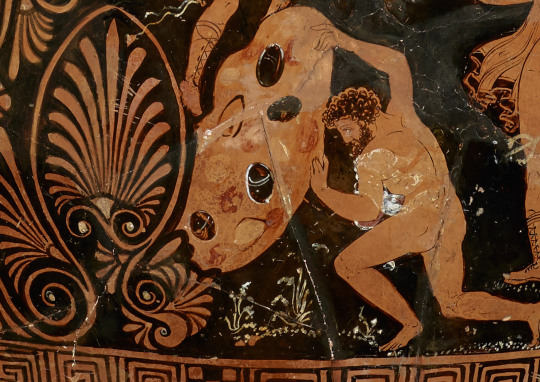
And so King Sisyphus became famous as the patron saint of pointless endeavor, of interminable striving to achieve an unattainable goal, of unending, permanent frustration. I remember reading Albert Camus’ book, The Myth of Sisyphus, back in college—and finding the author’s suggestion that we are all Sisyphus as we spend the days of our lives trying, to speak in Camus’ own terms, trying to find a way around the absurdity that inheres in all human endeavor. I didn’t much like Camus’ book back then and I suspect I’d like it even less now. (I don’t think I’ve ever actually enjoyed anything of Camus’ that I’ve read, The Stranger and The Plague most definitely included.) But there is something about Sisyphus and his horrible fate that even to this day frames the way I think about the High Holidays and particularly Rosh Hashanah.
It would be easy to describe the work of the holiday season as essentially Sisyphean in nature. We live out our lives against the annual return of these penitential Days of Awe when we are bidden to seek God’s forgiveness for our moral missteps and ethical errors. We do our best, obviously. Yet we never get it quite right, never behave quite as we ourselves think decent and right. As a result, there’s something of Sisyphus’s fate in the way we approach the holiday season and its endless prayers for forgiveness from sin but without ever quite finding the inner strength to obviate the necessary to seek God’s mercy at all by comporting ourselves well in the first place. To speak in Sisyphean terms, we push and we push our personal boulders up to the top of our personal hills…but then Elul comes around the following year and we’re suddenly back at the bottom of the hill. With the boulder. I follow the logic in that line of thinking. But it’s never seemed that way to me.
Life is full of uncompleted and uncompletable tasks. We read the Torah in our synagogues according to an annual lectionary cycle that never ends: when we get to the end of Deuteronomy, we simple roll the scroll back to Genesis and start reading again. The liturgy we recite daily alters slightly as we make our way through the year, but not too dramatically or even all that noticeably; we say our prayers morning after morning and wrap up at the end of the book, but then we when we return to synagogue the morning after that and open the book to the same opening set of benedictions that opened the service the previous day. I remember someone once telling me that cleaning up the house before your kids move out is like shoveling the driveway while it’s still snowing: a pointless undertaking you’re going have to redo anyway and might as well not bother with until then anyway. But this isn’t like that at all, not really. Eventually, it does stop snowing. Eventually, your kids really do strike out on their own. But no matter how much energy you expend studying Torah, you don’t ever get to the end. You’re never done. You learn more and more, but all you really learn—presuming your own intellectual integrity—is how much more you have to learn and how very little you’ve actually accomplished. For some reason, though, that aspect of Torah study inspires me more than it depresses me. And so it is with these holidays now almost upon us. It would be simple to find it frustrating, bordering on pointless, to recite this year the same prayers for forgiveness and divine clemency we’ve recited for all the years of our lives, none of us having successfully obviated the need to bother with all that praying by actually living lives free of transgression, misstep, or sin.
I know how Sisyphus must have felt. And yet…I can’t quite bring myself to consider the High Holiday season as the Jewish version of Tartarus. Every time I open the Torah, even after all these years, I find new insights, new lessons I hadn’t noticed before, new puzzles I hadn’t noticed before and find myself eager to solve. Daily prayer makes me feel vigorous and refreshed, not bored or cynical. And coming to shul on Rosh Hashanah to begin the whole penitential season again does not make me feel failed or doomed, but alive with the possibility of growth, of insight, and of transformation. In other words, to describe our annual festivals as Sisyphean because we’re still pushing the same boulder up the same hill is to miss a crucial point here: that the specific experience of pushing our specific Jewish boulder up our specific Jewish hill is itself far more satisfying than frustrating. (To say the same thing in other words, these holidays are far more process- than goal-oriented.) For me personally, and I suspect for many others, the holiday season reminds us of our potential for growth, even late in life, as it invites us to contemplate the possibility of growing into a finer iteration of ourselves no matter how many holiday seasons we’ve all lived through.
No one would tell an athlete that it’s pointless to run around the same track day after day because the track will still be there the next day. Indeed, the point of exercise is not that the track be ran around or that the weights be lifted, but that the person running the laps or lifting the weights become stronger and healthier through the process. And that too is how I think of our holidays: as an opportunity to become morally and spiritually stronger through the set of ancient rituals about to be undertaken by Jewish people across the world, not as an endless series of tasks that never get done despite our best efforts.
So, the short answer is that, no, I don’t find our holiday labors Sisyphean, stultifying, or absurd. Just the opposite, actually: as a human being ever eager to grow intellectually, morally, spiritually, and ethically, I welcome the chance to push my boulder up to the top of the peak once again fully aware that the point is not that the boulder be moved through my efforts, but that I myself be moved…to a new place, to a new set of personal goals, to a new set of possibilities. Sisyphus lives on as the symbol of tedium; in my life, the High Holiday season lives on, year after year, as the embodiment of the possibility of growth. And I don’t find that tedious at all. Nor should anyone!
1 note
·
View note
Text
I cooked tonight!
Okay okay bear with me on this I cooked a meal for myself tonight! It was (really greasy) chicken curry stir fry. It wasn't very good. But I did it! This is a small win. It has been a couple MONTHS since the last time I cooked food, and by cooked I mean microwaved baked potatoes. It's probably been close to a year since I've actually cooked a meal on the stove top for myself.
And I hated it, I hated every minute of it. It's so much work and my cooking always turns out wrong. No matter what I do it never cooks like the recipe says. It took almost an hour for something the net told me would take 25 minutes.
I hate cooking.
But I know that it's better for me than buying a sandwich from Jimmy John's every day, or processed junk food. I realized about a month ago all I'd eaten for a week was popcorn. Not to mention it's a HELL of a lot cheaper too than eating out every day.
I'm trying. I'm trying so hard to do the right thing and it makes me so frustrated I could cry. Things that seem so casual and every day for most people are just such struggle for me. I haven't been to the gym in weeks but I've been trying. I've been failing every time but I've been trying. I want to work out, I want to eat healthy, I want to look and feel good.
I don't know what is so incredibly wrong with me that makes these simple tasks so hard. It feels like I'm exerting so much effort to make something so simple and it takes so LONG.
I like buff guys and I know I will never get one to so much as talk to me unless I get in shape too. It just takes so long and so much work. I never feel like the working out is getting any easier, over months of doing the same thing I don't see or feel any improvement. It feels like I never lose weight no matter what I eat. I tried eating super healthy for a couple months and I was super proud of myself but then I got weighed at the doctor's and I hadn't lost a single pound. My clothes never get looser and eventually I give up because there's no change, like I'm accomplishing nothing. It feels like an absolutely sisyphean task and I just end up feeling miserable.
Why doesn't it ever get easier? I see guys online within months going from chubby, to average, to slim in less than a year! I know on a certain level I shouldn't compare myself to others but I have to wonder after a while why I just don't get any better.
I feel like if I don't figure it out and fix this stupid ugly body of mine I'm going to be lonely and single for the rest of my life.
1 note
·
View note
Text
suffered another relapse. i've been doing "good" the past few months and in just one trigger and a fragile self, I'm back in this situation again. made me contemplate that during the time I've managed to resist and overcome it, i felt like i was just pretending. pretending to be "good". pretending to be "strong". and that I'm always just a hairline away from being my messed up self again.
i know giving up is not an option, but I'm extremely tired of myself and this Sisyphean struggle.
idk where to go from here tbh. my thoughts are all over the place. I'm stressed because i wanna accomplish a lot of things, but at the same time not having the energy to do any of it.
hoping for a better tomorrow. and some good news.
0 notes
Text
Commentary regarding Icebergs (1 to 4)
· Ice: The Free Planets Alliance idiotically splits their 40,000 ships into three fleets far apart from each other
· C’mon, it was a nice idea, the execution was the problem here. That, and the commanders’ pride
· -
· Ice: Meanwhile, Reinhard and Kircheis make moon-eyes at each other
· We all have to admit that, when we start this, there’s a lot gazing into each other’s eyes that makes you a bit suspicious
· -
· Ice: Reuental and Mittermeyer go on a date
· YOU GUYS KNOW I ACTUALLY SUSPECTED THEM OF BEING A COUPLE
· -
· Ice: Kircheis gently nudging Reinhard to be a bit more empathetic than comes naturally to him.
· I agree with this
· -
· Ice: Annerose is a tragic figure, and on the surface she’s characterized as a pretty one-dimensional martyr-type, which can be frustrating and confusing in a show where even the most minor character contains multitudes. But Annerose does contain multitudes—they’re just hidden under a series of facades, erected by a woman who has been subjected to a decade of sexual slavery
· I hate to say it, but this is true
· Still don’t like her though
· -
· Ice: and by a creative team that was trying, in 1988, to tell a story about two boys falling in love.
· Ok, I wasn’t expecting them to jump right into it, but let’s go
· Maybe they’ll convince me
· -
· Ice: She is beautiful, docile, and a victim, the quintessential damsel in perpetual distress. She feels like a symbol, in a world richly populated by humans; her identity is presented to us as revolving entirely around men. There’s no way around it: As our first named female character, Annerose is irritating as hell
· I ain’t gonna disagree with this
· -
· Ice: the fact that in the LoGH novels and short stories, Annerose is heavily implied to be Kircheis’s love interest, whereas in the anime, Kircheis’s love interest is Reinhard. There are a few ways we know for sure that this was an intentional divergence, which we’ll definitely bring up when we get to them
· I’m curious, cus the show did sell me the whole romantic subplot between Sieg and Anne
· -
· Ice: Yang takes command of the remaining fleet after his commander is injured, and promptly outsmarts Reinhard when Reinhard tries to split his fleet down the middle by…splitting the fleet down the middle himself. This forces the battle to become a clear metaphor for the endless futility of this 150-year-war
· THAT’S VERY TRUE, NICE
· -
· Ice: Yang’s history and relationship with Jessica will get fleshed out more in the future
· Guys
· No, guys
· Jessica was awesome
· She was an amazing female character
· I’m still very sad that she had to die so soon
· And without accomplishing much (or having much airtime)
· -
· Ice: But also 2) train yourself now to peel away any heteronormativity that’s coloring your assumptions about what the show wants you to think.
· Ice, I think you’re starting to push it…
· -
· Ice: Who is this mysterious and beautiful baroness attempting the sisyphean task of cheering up Annerose? Why, it’s Magdalena von Westfalen
· I LIKED HER AND THEN SHE DISAPPEARED FROM THE PLOT, WHAT HAPPENED
· -
· Ice: Magdalena takes absolutely no shit from anyone, and I (Elizabeth) would die for her.
· Same
· -
· Ice: Who the fuck is this person? Yang has a “ward”? Why? IS YANG BATMAN?? These are all good questions to be asking yourself.
· Yang trying to be Batman would be hilarious
· Cus I just see him complaining every step of the way
· -
· Ice: Character development in small visual details: Julian styling his collar and sleeves to exactly match Yang here shows his hero worship and desire to emulate him.
· OOOOOOOOOOOOOOOOOOOOOOOOOOOOOOOOOOOOOOOOOOOOOOOOOOHHHHHHHHHHHHHHHHHHHHHHHHHHHHHHHHHHHHHHHHHHHHHHH
· -
· Ice: White men: eating this nationalist crap up. White women: feeling slightly uncomfortable but not saying anything. POC: so over Trunicht’s bullshit that they literally all faked sick to avoid him.
· Ok, no, I’m loving this
· -
· Ice: By now I’m sure you’ve noticed that the power structures in LoGH are incredibly male-dominated. (…) Hell, LoGH doesn’t indisputably pass the Bechdel test until episode 103 out of 110.
· Story of my life…
· -
· Ice: The handful of female characters that we do get to know exist within this society as fully defined individuals
· Ok, this I don’t completely agree with
· The author tries to give some sort of dimension to the female characters he creates, but they all end up… limited. And not in the way that represents “Oh, society doesn’t let women do what they want”, but simply in the way that women… are still women. And this is extremely hard for me to explain.
· I’m conscious that all the women in the show are women. And you probably are going “Yeah, and what’s the problem with that?” but that’s the thing. Like being blond or black or needing to wear glasses, it should just be a characteristic and not something that defines them (even if society then stereotypes you and forces you into going through certain events that become common for said characteristic – however, said experience is always personal). A female character in LoGH is female first and then something else.
· That isn’t to say that what the author did with his female cast isn’t great, because it is. He cared enough to portray their struggles, even if he didn’t identify with them (and because of it, they feel somewhat generic), and I’m pretty sure that the years the novels and the animated show came out in weren’t as kind to female characters as he was. However, by our current standards, it’s very lacking.
· I’m not sure I managed to express myself well, but I’m moving on.
· -
· Ice: Meanwhile Julian, a 14-year-old boy, happily and enthusiastically keeps house for Yang, cooking and cleaning and making tea. While many of the female characters overtly break with the traditional roles assigned to women (by entering politics, the military, etc.), Julian is one of the only characters to push in the other direction; and it’s important that (spoiler) the show never plays this for laughs or really remarks on it at all
· Huh, this is true
· Very true
· And I never realized that
· Nice one, show!
· -
· Ice: And again we see his passivity as he lets the silence stretch until she finally walks away.
· Kinda of one of the reason why Yang sometimes pissed me off
· -
· Ice: Kircheis is rudely accosted by the sinister Oberstein.
· Not a fan of Oberstein, I see
· Well, I was informed of it, so I was expecting it
· -
· Ice: Oberstein absolutely uses his malfunctioning robot eyes to intimidate people and then pretends he was unaware.
· I like this idea, but at the same time I really think he’s just like thatTM
· -
· Ice: But first, Oberstein. We’ve seen glimpses of him in the background before now, but it’s finally (deep sigh) time to meet everyone’s least favorite character. You probably don’t hate him yet, but you will. Oh, you will!
· HA!
· -
· Ice: Kircheis, a very smart boy, hates Oberstein pretty much the second they meet.
· I actually disagree
· I think Sieg was wary of Oberstein
· But to be honest, I never thought Sieg hated him
· In fact, I think Sieg would one of the few that would almost like Oberstein
· -
· Ice: we’ll have plenty of time to hate Oberstein later on
· COME AT ME
· -
· Ice: Almost as soon as Reinhard (jumping out of the car like a little kid, bless his heart)
· God bless his heart, indeed
· -
· Ice: Reinhard seems to interpret his father’s meaning to be that Annerose consented, or at least assented. Horrified, he sprints upstairs and demands to know why she would do such a thing. Her answer, adding yet another layer of Fucked to this already Extremely Fucked situation, is basically, “I’m doing it for you.”
· Ice: No pressure, Reinhard!
· *aggressively points to this*
· -
· Ice: Kircheis, with no direct way to help, does the only thing he can: He follows Reinhard on a dangerous, er, mission in the hope that he can maybe keep things from escalating too much. Which… is pretty much Kircheis’s job in life, to be fair.
· God bless that boy, he tries so much
· -
· Ice: Reinhard has never, not once in his life, chilled.
· THAT’S WHY WE LOVE HIM
· -
· Ice: This is a huge turning point for Reinhard, who finally has somewhere to aim his ambition: He’s going to do whatever it takes to get Annerose back, and if that means rearranging the entire universe to suit his needs, that’s what he’ll do.
· Like the way Ice expresses this. Rein has an enormous amount of ambition, but said ambition had yet to take a shape. This sentence implies that Rein could have used it in other areas, but it was this event with his sister that ultimately guided him unto a specific path. I like that idea a lot.
· -
· Ice: Kircheis isn’t going with Reinhard because Annerose wants him to; he isn’t even going with Reinhard because Reinhard wants him to: Kircheis is going with Reinhard because he wants to.
· THIS
· -
· Ice: I assume Reinhard looks so relieved here because he somehow managed to walk successfully down a flight of stairs backwards.
· I THOUGHT THE SAME THING
· -
· So far, I’m enjoying Icebergs
· I think the homosexual subtext they’re trying to read into is kinda forced, but nothing too grating so far
· -
5 notes
·
View notes
Text
A pledge to unite international students and tech
Sophie Alcorn Contributor
Share on Twitter
Sophie Alcorn is the founder of Alcorn Immigration Law in Silicon Valley and 2019 Global Law Experts Awards’ “Law Firm of the Year in California for Entrepreneur Immigration Services.” She connects people with the businesses and opportunities that expand their lives.
More posts by this contributor
Dear Sophie: What does the new online classes rule mean for F-1 students?
Dear Sophie: Is immigration happening? Who can I hire?
I count myself blessed to have been contributing my weekly Dear Sophie articles to Extra Crunch since the beginning of 2020. The inspiration for the column struck last December after I returned to the Bay Area from speaking at TechCrunch Disrupt. I was doing my hair, and I remember feeling the spark of the idea begin to take shape in my mind. Before I fully understood the shape of the thought, I knew it was already resonating in my heart.
The last three-and-a-half years have been hell for immigrants and hell for immigration lawyers. Probably a lot of caring government immigration adjudicators have felt it, too. But it’s like an abusive relationship: The people who keep getting knocked around by the administration are completely powerless and literally have no voice, as they are not entitled to the right to vote. Many immigrants live in fear that the cost of opening their mouths would be retaliation and deportation. So we need a new paradigm.
The latest insult to injury affecting high-skilled immigration, in the wake of consular closures and the the H-1B ban, is last week’s announcement that raises the possibility of the potential deportation of hundreds of thousands of international students currently enrolled in U.S. higher ed for taking online-only classes during COVID-19.
Even with litigation by Harvard, MIT and Johns Hopkins, and some programs offering qualifying courses for students to maintain enrollment, the clock is ticking. My firm is inundated by requests from students both local and even abroad, struggling to find a way to continue to simply “be” in the U.S. legally.
Many others are desperate to find employment to remain in status in the U.S. on OPT and STEM OPT work permits. Working visas such as the H-1B, a common option for many recent graduates, are also disintegrating. So many are scared that they could be forced to leave, as they have been now, for years.
Why is it hard to leave? Well, think about it. Immigrants are people. Your friends, your neighbors. Like you. Some international grad students who have been here for almost a decade completing cutting-edge research put down roots and might be pregnant now or have U.S. citizen children, not to mention, potentially have been working for decades for lucrative job opportunities ahead.
And then, beyond the obvious COVID-19 health concerns about departing the U.S. on international flights in the midst of a pandemic, some home countries aren’t even accepting citizens immediately and returning students may face long waits for flights with potentially exorbitant fees. Many students, families and university administrators around the country and around the world are scared.
So many immigrants are trying their best, but under this administration it feels like a Sisyphean task — never enough — as the rock keeps rolling back down the hill.
All last week I found myself fielding The Zoom Calls of Panic: the brilliant UX designer who tells me he’s in purgatory; the accomplished Ph.D. who laments that “the U.S. is the only country that won’t take me after I get my U.S. Ph.D.”; the amazing business woman crying that she needs an extraordinary ability visa not for herself but so that she doesn’t disappoint all the families of all the people for whom she has created jobs in the United States.
Yet also, last week, there were so many glimmers of hope, opportunities for my clients to make decisions, and chances I got to take to show somebody that they can have choices, routes, strategies and hope.
One of the most inspiring things was all of the employers who have been coming out of the woodwork to support international students and grads to sponsor them for visas. Five years ago, that was simply a matter of routine business necessity in a system that was predictable, secure, navigable and easily accomplished in volume. Now, meeting a U.S. employer excited to sponsor international students as an act of solidarity gives me chills as an act of courageous heroism.
One of the events that almost moved me to tears last week was when I stayed up late one night and dragged myself to put on makeup after I finally got my elementary school kids to bed. Bleary, I provided a rambling 40-minute YouTube live stream interpreting the F-1 visa ban for international students after they had requested this from me on LinkedIn saying “In Sophie We Trust” (no pressure!). During the live stream, I received a comment from David Valverde, founder of Pranos.ai. He said that he had been an international student and that he would pledge to consider international students for job openings at his rapidly scaling startup.
We stayed in touch throughout the week on LinkedIn, and every time a stranded international student with a tech background who needed a job contacted me, I sent them David’s way. We finally connected on Friday, and somehow egged each other on to commit to volunteering in a self-imposed 2.5-day “hackathon for social good.”
This weekend’s result? We proudly announce the Community for Global Innovation (CFGI), a movement centralizing how companies and individuals around the world can stand in solidarity with international students and the belief that everybody deserves a chance to succeed.
CFGI is a constellation of top startups, VCs, professionals, nonprofits, international students and grads. We pledge to support international students, create awareness and effect change.
Through the platform, companies take the CFGI Pledge to support international students: “If you’re international, no problem. In our team, everybody has a chance.”
We also teamed up with Welcoming America, a leading U.S. nonprofit, accepting donations to make the U.S. more inclusive toward immigrants and all residents.
We’re actively seeking the support of volunteers, corporate donors and community members such as international startup founders who know it’s time to share their stories.
Growing up as the daughter of an immigration attorney and an immigrant, I know that innovation can truly come from anywhere. Diversity is critical for innovation.
The technology we rely on every day was often invented and created by people who had the courage to leave their homeland and start a new life. We all benefit as they continually create more jobs in the world as we move to a new global interconnected economy.
Life is not a zero-sum game: When we can come together to support one person to succeed, it benefits us all.
Everybody deserves a chance.
As a result of CFGI, I’m blown away by what David is doing, and I’m so excited to see how others contribute. David’s company Pranos.ai is a revolutionary mass media platform that converts any window into a transparent digital HD display. David told me:
“Especially in an early-stage technology company, every new hire has an incredible effect on the company’s destiny. Hiring highly skilled top-talent at the beginning is critical to how Pranos.ai will create many hundreds of thousands, if not millions, of jobs globally through the growth of the gig economy.”
Pranos.ai was the first company to take the CFGI Pledge. They are open to considering any candidate based on merit, regardless of immigration status. David is proud to recruit a diverse team and stand in solidarity with international students.
Image Credits: pranos.ai
And why do I care about all of this so much?
I know what it’s like to be on the outside. Even though I practiced as an immigration attorney right out of law school, I gave up my career for many years to take care of my two small children.
I experienced postpartum depression and things snowballed as my dad, who was my dear mentor and friend, passed away unexpectedly and then my marriage came to an end. I wondered how I could survive in Silicon Valley as a single mom without a professional network.
Imposter syndrome shook me to my core. I longed to be an entrepreneur but I found reasons that it seemed impossible, like that I didn’t know the slightest bit about coding.
So, I decided to serve others. I began my immigration law firm out of my kitchen and met clients at a Peet’s on Castro Street in downtown Mountain View that has since turned into apartments.
I offered pro bono immigration services to people facing deportation who had experienced persecution based on their sexuality and individuals who had experienced domestic violence. I thought, “Well, at least I can support others.”
Little did I know that my clients were actually the ones supporting me: to believe in myself and create a new life. I’m inspired by the amazing courage of immigrants and the grit and tenacity of everybody who has the courage to follow their dreams.
I’m delighted by the access to information and spread of knowledge that we’ve all been able to pull off so far with “Dear Sophie.”
And now CFGI is here, where companies can take the pledge so they can be attractive to the world’s best and brightest who will know that hiring decisions are based on merit.
I’m also thrilled to see what will come next.
I stand here in deep appreciation of everybody who comes together in love and support of one’s neighbors. Because we all know, this is actually a very small, lovely blue dot in the universe, and we are all neighbors. The lines on the map that divide us that we call “walls” don’t actually separate the human spirit, or love, or ideas, or even germs, as we’ve all so keenly learned.
With so many global challenges and opportunities, I understand that our immigration struggles are simply a microcosm of so many things, and we can’t and won’t go back to the way things were.
We here who are privileged enough to live in Silicon Valley know how fortunate we are. This is where the future is being created, where the veil is thin between thoughts and things. Here, ideas rapidly come into creation and reality.
Here, we see each other on eye-level. We seek out challenge as opportunity. And we know that one focused person is more powerful than a million who are not, so innovation can come from anywhere, and one person can change the world.
So maybe here, on this leading-edge outpost, between the San Andreas fault and the crashing waves of the Pacific, we have an opportunity to take a stand:
We believe that everybody should have a chance to do well. Let’s start by standing in solidarity with international students and graduates through CFGI. And since what benefits one of us benefits us all, perhaps with the growing momentum, we can support others, such as children in immigration jail, asylum seekers, Dreamers and everybody else who deserves a chance.
Because, but for the grace of God, there could have been born I.
I am thrilled to announce CFGI. Remember, life is not a zero-sum game. If we can come together in love to support just one person, that ripples out and benefits us all.
I hope you’ll join me.
Learn how to make immigration work for you at Early Stage where immigration expert Sophie Alcorn will troubleshoot the many snags that can affect early-stage startups that are trying to bring talent into the country. Buy your tickets now.
Read “Dear Sophie” on Extra Crunch; use promo code ALCORN to purchase a one or two-year subscription for 50% off.
0 notes
Text
The final version of my end of course evaluation for one of my least favorite classes
[Instructor’s name changed for privacy purposes]
I feel obligated to start my evaluation by saying Dr. Smith does communicate information clearly to the class. I feel the material covered was appropriate, adequate, and reasonably in depth. What little approbation I have ends here. The remainder of my evaluation is not hyperbole.
I understand most students find A&P II to be immensely challenging. My complaints do not stem from any difficulty of the coursework. I received in A in the first A&P class, but despite increasing my resolution I have struggled to maintain a C average under Dr. Smith’s instruction. Even merely attending lecture became a challenge. Meetings of class left my soul aching in ways no other class has while answering the assignments placed me in an irritable mood which frequently lasted days on end. Whatever knowledge I took away from class wasn’t worth the Sisyphean drive it took to obtain.
I can only pinpoint the exact feeling with which Dr. Smith’s lecture left me from one point in my life – a physically abusive relationship of nine months. In both situations, I universally over-analyzed my actions, strenuously trying to avoid provoking an abusive response. I found myself spending a minimum of 15 hours on each assignment, despite knowing full-well that Dr. Smith would fail to clarify details of the assignment until after the due date and penalize me consequently. I repeatedly found notes in the margins of my case studies implying I had neglected to answer parts of the question – often immediately adjacent to the answer I supposedly failed to provide. It is unclear to me whether this behavior was a malicious response to a complaint I voiced or merely incompetence in grading the assignment correctly.
I find Dr. Smith to be unapologetically egotistical. Narcissists tend to treat the people close to them as extensions of themselves. In my experience Dr. Smith views her students like so. Our successes are her successes, while our failures are our own. An instructor should measure their success by the success of their students. Dr. Smith takes this to the extreme, especially by distancing herself from the student failures she is responsible for. Dr. Smith fails her students frequently and refuses to examine these failures in a critical light, instead choosing to take credit for student’s personal accomplishments.
Lastly, I must make mention of Dr. Smith’s draconian absence policy. In terms of excused absences, her policy on working with students is simply nonexistent. Assignments are to be turned in to class, on time, without exception. Dr. Smith refuses to understand that a student undergoing emergency surgery does not have the option of turning in the assignment early or in class. I’ve spoken to many instructors who have recounted stories to me of students arriving at their office in tears to inform them of a death in the family. Not once have any of them informed me of a refusal to work with these students regarding what is obviously an acceptable absence. In a private meeting, Dr. Smith accused me of having no sympathy for how difficult it would be to quantitatively determine which students are deserving of an extension. She was right – I don’t have any sympathy for how difficult such a task must be because it is not truly difficult. It’s not prejudicial give extra time to a student who had an emergency surgery or a death in the family when other students did not suffer from such handicaps. Refusing to accommodate students with legitimate absence amounts to refusing to give accommodations to a student with disabilities for the same reason giving extra test time to a student with dyslexia isn’t discriminatory to students who don’t have difficulty reading.
Dr. Smith is a botanist placing herself among physicians despite obviously not having clinical experience. I simply refuse to treat her as an authority on clinical medicine. What made this class unique amongst the other unambiguously terrible classes I have taken is Dr. Smith’s misguided notion she isn’t a bad instructor. No other instructor who has failed at their job so vehemently insists they are compassionate and fair. Quite the opposite in fact. If Dr. Smith were willing to accept her personal failings she could make immense progress in improving her teaching. I won’t hold my breath though.
#shade thrown#harsh evaluation#instructor eval#course evaluation#course eval#instructor evaluation#college#college nonsense
2 notes
·
View notes
Note
for the ask prompts: oq - 8
This has been sitting in my inbox for anywhere between a truly shamefully long time and an eternity, right? I promise I absolutely love getting prompts, and loved filling this one, too. Thank you for sending it, and I hope the result’s worth the wait!
Sometimes Robin wonders what kind of sorcery it is that draws him to the Queen with such relentless, irresistible, unfathomable force.More often nowadays, he simply succumbs to the feeling: the attraction, the remarkable sense of kinship, the desire to see more of the complex woman under the armour—all of it. Following his heart, his gut, his instincts, has always served him rather well after all. So he no longer tries to resist the mysterious pull.
But oh does she ever. Fights it tooth and nail, attacks it with rage and bile and haughtiness, staves it off with cold indifference, hurling jagged words and piercing looks his way in a valiant effort to deny the undeniable.All for nought.
All she accomplishes—all they accomplish, for Robin, much as he craves her company, removes himself from it when she so wishes—is a brief respite as they drift (tear themselves, more accurately) apart before they inevitably come back together time and time again.
Tonight she’s in his arms once more—Regina, just Regina when they’re like this, body and soul bared before the other. She’s quiet, pensive, that perpetual cloud of wistfulness ever hanging over her as her fingers ghost over his arm in swirling patterns chased by shiver after shiver. She’s present enough to catch them despite her mind clearly wandering, for he feels her blink rapidly with each pleasant shiver of his, her long lashes tickling his chest. Robin breathes her in, the cinnamon clinging to her skin and the faint whiff of apple from those dark, luxurious locks he can’t but card his fingers through over and over again, scratching her scalp just so and feeling rather than hearing her content sigh. He tries not to think of what will inevitably follow—what always follows—these precious moments that are much too few and far between.
If you ask him, that is.Regina on the other hand seems to be of the opinion they’re entirely too frequent.
“This needs to stop,” she says even as she buries her nose into the crook of his neck in what she’d no doubt deny is a nuzzle.
He doesn’t respond—they’ve had this conversation before after all. It never is much of one anyway—not of late. Just her talking herself down from this high and out of this dangerous folly. There doesn’t seem to be anything he can do or say to change the torment she puts herself through or its outcome. This is how it always goes—Robin listens, soothes, holds her for as long as she lets him…and lets go. Lets her extricate herself from pining arms and crumpled sheets and disappear, knowing she’ll spend the night replacing every ounce of distance crossed with two more to put between them.
Yet tonight, tonight the thought of all that blasted distance that has proven a Sisyphean task to maintain anyway scares the living soul out of him. She nearly died, again, had put herself in harm’s way for reasons darker than simply protecting innocents, and he just—can’t.He can’t lose her.When Regina moves to disentangle their limbs, Robin holds her closer, hugs her just tight enough to show he means to cherish and not hurt or coerce.He won’t ask her to promise to keep herself safe, to take better care of herself, for he knows—and it breaks his heart in more ways than one—that she doesn’t deem herself worthy of such basic concerns, and would only lash out at him for such sentimentality. It wouldn’t be the first time either.
“Just another minute,” he requests instead, and she deflates against him with a huff, but curls her fingers around his and exhales sharply when he brings their joined hands up to kiss her knuckles.
“Robin, this isn't…”A relationship. He knows it isn't—tells her so, too. It’s not a relationship; but it is…something.
Perhaps those words slip out as well, or perhaps the soft touches and kisses peppered atop her head are much too telling on their own.
Her entire body tenses in his hold.
“This was a mistake.”
This time he wills his arms to release her before she even makes a move, and watches her gather the crumpled sheets to her chest as she flees the warm bed.
A thousand words struggle to spill forth—of affection, of reassurance, of concern, and so much more; but Robin stifles them all. He shan’t, however, let her walk out of here tonight, like countless times before, with even a speck of doubt about one thing.
“Regina, I ask nothing of you that you aren’t willing to give.”
She’s quiet for a moment, clutching her clothes that aren’t quite armour enough as she wrestles herself furiously into the tight corset. That in itself, the fact that she seems to forget about her magic momentarily, is a testament to her distress. It doesn’t last long though—with the Queen, the snark is never far away.“Funny—I thought you’d just asked me to stay another minute. Which one is it then, Thief?”“Regina—” he groans. Because they’ve been through this before, haven’t they? She’ll needle him and twist his words and actions to provoke another heated exchange, but he knows her tactics all too well by now and refuses to partake in this manoeuvre to distract from the real issue. He’s not playing this game with her anymore.She, on the other hand, has more to say, and her eyes are sharp and swirling with traces of the fear she strives to suppress and the anger she’s whipping herself into instead.“You don’t own me,” she spits defiantly, hands curling into fists against her stomach—another tell that the very thought, and perhaps memories of a marriage past, fills her with dread. “I’m nothing to you. You’ve no right to—”“I don’t own you,” Robin interrupts, sitting up on the bed, quite frustrated now and desperate to make her see, “and I certainly wouldn’t dream to. But you cannot make me not care, Regina. We can go back to pretending I don't—although I’ve done a piss poor job of that, and there’s no reason to think that’s going to change. And I’m not the slightest bit sorry about that. You know why? Because you deserve to have people in your corner. And so here I am. In whatever way you need, whenever you need. All I ask is you remember that. You’re not—You don’t have to be alone, Regina.”
She stares over his shoulder with a blank expression, the frown from before gone, a slight pout lingering on her lips, as though the very concept were unheard of and simply inconceivable.
Does she think so little of him, or of herself?And with every ounce of his being and every last corner of his heart, he wills this feeling to translate to his face in all its sincerity.
When she finally meets his gaze, she winces at what she sees there.
And heavens, when did he fall so hard, so deep?
She snaps her eyes shut, a shadow of pain crossing her features as she whispers:
“But I want to be.”
He doesn’t stop her when she storms out.Robin sits on the rapidly cooling bed with his shoulders slumped and his face buried in his hands. The thought of the cold shoulder he’s getting from her for the foreseeable future makes the swooping emotion flow into words he’s half-mortified to voice to the empty room.
“Every day I need you more,” he sighs, “and every day you push me further away.”
#ouat#oq ff#outlaw queen#oq prompt#missing year#bee writes fanfic#reply#evilqueens#guys please feel free to send me prompts#I won't promise to fill them quickly because I know that's unlikely#but I will fill them eventually - and happily :)
42 notes
·
View notes
Text
Dreams of War
It’s somewhere around in the early 2000’s, in my grandfather’s kitchen, him lying on his tiny sofa bed. He’s sleepy, but he’s reciting Petőfi poems and asks me if I know them by heart. I don’t know what to answer. He goes on reciting them, then he’s flowing into an unconscious, never ending tale about his life, the automatisms he mastered during the tragedy that the 20th century was. A 18-year-old young Hungarian boy as a soldier in the obligatory line infantry of the newly founded Socialist Republic of Romania, he enters a confusing territory after the II. World War in 1947. Born in 1929 in the Kingdom of Romania, he lived through the brief Hungarian period of Northern Transylvania, full of hopes and dreams, arguably desensitized to any historical and demographic facts of his age. Within a very traditional and closed Szekler society, he entered the army.
Above his bed there are endless pictures, icons and tiny souvenirs of Saint Mary – the almost mythical, miraculous Babba Mária –, signs of his manic obsession with the transcendental female figure that led him through hardships and, ultimately, the army experience. While I’m sitting there considerably bored but also intrigued, listening to his ancient, singing-like dialect, I imagine him celebrating a Catholic mass to a group of Romanian Orthodox soldiers in the woods, among shelter-tents. He speaks about writing poems, during breaks, hiding them in his pocket. When a comrade finds one of them and asks him about it, he tells he’s writing in the manner of Petőfi Sándor, 1848 revolutionary young poet. The soldier doesn’t understand the language he writes in, asks for translation, the young man is struggling with it, and gets accused of the poem being of fascist character. While he lies there, his eyes half closed and his chopped-off half finger raised in the air, he repeats the words of his fellow soldier in broken Romanian, over and over again.
When I visit him in the late 2010’s at my father’s place, he yet again lies on a bed, this time very sick. He’s still writing his poems in an old notebook and when I sit next to him and try to shout my useless and uninteresting life events so he could hear them with his nearly deaf ears, he suddenly enters this hypnotized state and goes back to the 1947 forest among his comrades, where every poem is a source of threat, every piece of paper shall be destroyed in the name of Stalin, and every hope is getting stomped into the ground, the great battlefield of the nations who claim to own it.
I pretend I haven’t heard the story before, as he, a small stature man with great inferiority complex with a history of cruel and violent aggression towards my father advises me to keep praying to the Babba Mária.
But the Babba Mária is absent. She’s witnessing everything as a negative theological figure in these inherited automatisms. She’s there in picture but not in form: my grandfather, in form, lying on his back, absent from his own inner truth. Absent in love, fully present in the beatings, humiliating and endless, pointless work. He’s dependent on his son’s care, tied to a bed. He’s dependent on mirroring him, going into cunning games between them, when my grandfather calls him screaming during the night. His son gets up, checks on him, shouts, then goes back to sleep. The cycle ends, what goes around, comes around.
When I accomplish something, my father isn’t there. When I fail at something, he is. When I don’t like something, he forces his opinion on me, so I’d like it. When I have an opinion, he contradicts it, when I want to go with him on his trips, he promises to bring me, then we never go. He’s betraying himself, as he relives and reenacts the buoyancy of the belt in the air before it hits the target, as the buckle’s silvery tone flickers in the air. The underlying sad shine in his eyes reflecting it, transforming him into a big baby. A big, paranoid baby, sitting in katatonic stance in the car with the empty wine bottle, as the police cars surround him. Policemen trying to convince him to abandon the car and to get to the ambulance. He’s absent to himself, he’s negative theology embodied, Babba Mária and and his prematurely deceased sclerotic mother open his cavernous wound to schizophrenia. The unattainable female figure, the sisyphean struggle of coordinating love with devotion and profession.
Half a year earlier from his descent into the abyss, my grandfather passes away. I receive a text message with the news, I call back. His voice is lighter than I expected, but what was I expecting? The traditional conditioning to grieving on command surely is something we all internalized from a young age, as no one taught us that grief comes in unexpected times and places and is not narrowed down to the death of a person. I grieve absence every day, by being present.
His voice is rather tired but melodic as he recalls the night when he he’s hearing a moan from the other room, wakes up to check on his father. His father sliding down from the bed, his urinating urge forced him out, they struggle to find a comfortable position to carry him to the toilet, he escapes him from his arms, he’s on the ground, he’s trying to get up, he uses every piece of his last strength to reach the bathroom, but it won’t come out, nothing is coming out, he cries and squeezes my father’s arm then they collapse on the bed, father in his boy’s arms, exhaling his last breath into the void of 4 AM. Then silence. Then a cross on the forehead, Our Father whispering, men of war amongst themselves, finally hugging each other after fifty years. Like an imaginary Iron Cross on a long-forgotten poem in a pocket. Ambivalent fascist character on a land of equally absent comradeship that is.
I mirror the absence in front of a black mirror, where I no longer see myself as the constructed gender roles at war amongst themselves. Despite the ungendered brain, I have to be the father to myself. When I don’t show up, these roles reach the edge of the abyss, where they stop and stare into it, they recoil in front of the tunnel at the end of the light – eternal in-between-ness.
Last night I had a dream where I simultaneously saw myself from the outside, yet I felt everything. A sepia-toned setting, small boy with his father in a deep forest on a steep hill, lying on the ground. Fighter aircrafts’ sound in the background, father teaches his son to do it anyway. He’s mimicking swimming in the leaves on the ground, searching for something. Both fully armed, dressed in camouflage, the boy’s small head is disappearing in his cap. Suddenly the leaves clear on the ground and giant leather belts start to appear, they surround the hill, the mountain is like a fist squeezing in the air – giant, giant, shiny leather belts fixed on the ground with metal bolts. The father shouting commands to his son to clear the leaves, to pop up the bolts to release the tension, as unimaginable and unidentifiable cylindrical metal objects emerge from the soil, like a hybrid between a landmine and a rifle. They pop up each and every bolt and the objects blow up in the air, tearing holes on the body of this breathing forest, both son and father are levitating in the air, but the belts stay somehow, they keep surrounding the hill and they will never, ever break, as one needs to shift their perspective for old weapons to disappear. When the perspective shifts, still with the boy’s confusion deeply felt in my body, I see a large artificial field, like a golfing area, surrounded by fence. Inside it, there are six fascist commanders, in full-black attire, their faces covered in black shining liquid like tar, with whips in their hands. When I fly over them, they transform into six me-s, six women in white translucent dress, almost naked. There are two tiny black aircrafts on the field, lying on the ground like dead artificial bats, with vibrating red eyes. From the middle of the field a group of twenty giant high priestesses emerge in blue, white and red, long uniforms and headdresses. They’re terrifying. They shout commands and force us to obey, their mechanical and artificial unisound preaches us to form a hexagonal shape and collapse. I collapse in front of my six selves, barefoot, then I wake up, with my grandfather’s warlike obsessions in my veins, with my bent over father-child in my split soul. With my breath absent, with the remnants of the patriarchal order in my spine, I raise my body to show up for myself, yet again, like Sisyphus did for his stone.
0 notes
Text
The Most Important & Definitive MCU Ranking, Probably
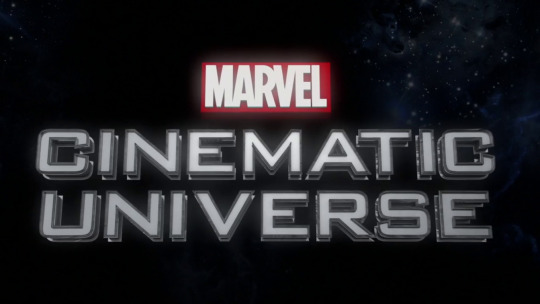
Come one, come all, and witness my subjective attempt at objectivity! The Marvel Cinematic Universe, whether appreciated or disavowed by fan or critic, is an ever present entry into the canon of film history and the cultural zeitgeist. With multiple MCU films releasing every single year between now and the end of time, there is no denying the sway these films hold over the Western cultural conscience and the conversations about the film industry, art, and fandom that they encourage. I have found in creating my ranking of the Marvel Cinematic Universe that list-making is an ephemeral practice in the subjective. Better yet, my making of this list has been a Sisyphean practice in futility, as I constantly revise these rankings based on the Marvel movie I’ve most recently viewed, or upon hearing a rousing argument from a friend, or some such constraint on my ability to establish objectivity in my arbitrary designations. Thus, I invite you to be my editors through this endless struggle. Here is my proposed draft of the MCU films, ranked from worst to best. Obviously, revision will be necessary as time moves ever onward, but if I am blatantly incorrect please let me know and we will collaborate together on some sort of truth in this cynical world.

15) Thor: The Dark World
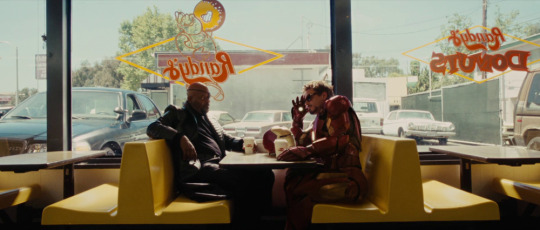
14) Iron Man 2

13) The Incredible Hulk

12) Iron Man 3
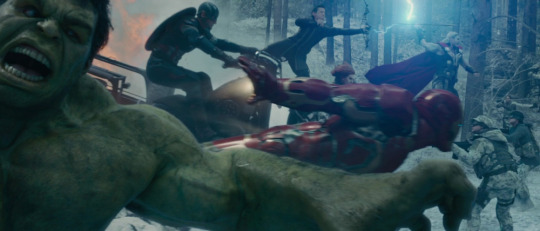
11) Avengers: Age of Ultron
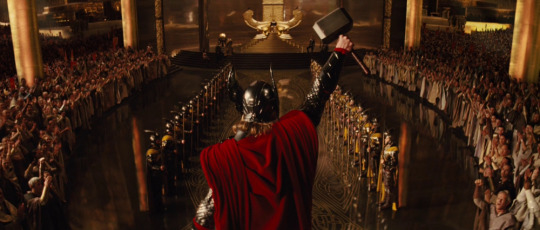
10) Thor

9) Captain America: The First Avenger
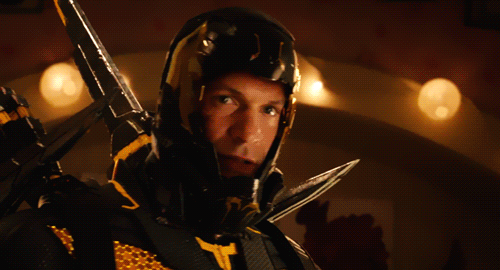
8) Ant-Man
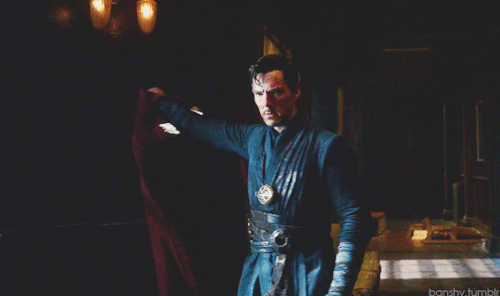
7) Doctor Strange

6) Captain America: Civil War
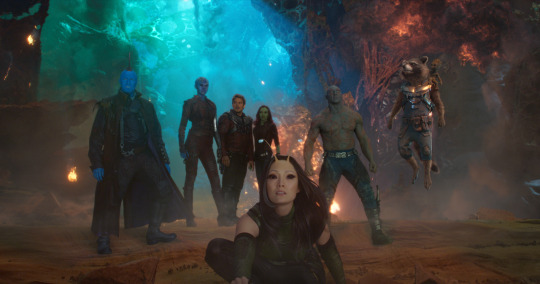
5) Guardians of the Galaxy Vol. 2
Guardians of the Galaxy Vol. 2 is an endearingly warm film that returns to the cast of misfits that shattered the Marvel movie-making model. I’ve written about the film at length here, so I’ll keep the details brief. GotG Vol. 2 offers delightful moments of character and light-heartedness that is purely joyful. This movie is among the best that the MCU has to offer, and James Gunn, the director, continues to bring instinctive innovation to the superhero genre through wit, charm, and bad-assery. The Guardians of the Galaxy films nestle seamlessly between episodic space opera, a groovy soundtrack, and the most out-of-leftfield, off-beat superheroes that any studio has dreamed of. I left the screening of GotG Vol. 2 full of adrenaline and the largest, cheesiest grin beheld upon an apathetic college student’s face.
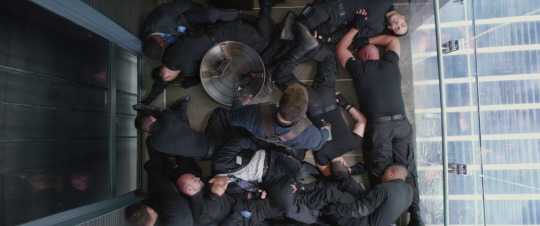
4) Captain America: The Winter Soldier
Captain America is the MCU’s most iconic superhero among its current roster. In 2008, Robert Downey Jr’s Iron Man was the catalyst of this growing film universe and a symbol of all that is excellent of that which followed. Unfortunately, the Iron Man sequels set precedent for the lack of imagination and/or execution that has defined MCU sequels (most will argue in favor of Iron Man 3, but I was largely unimpressed and haven’t revisited it since the first time). Robert Downey Jr. remains grounded as the inimitable Tony Stark, but unfortunately his charm is unable to sustain the unsavory sequels. This is not the case for Captain America, whose films continue to supersede the original one. Captain America: The Winter Soldier is bold and exciting, giving the audience an engaging plot, magnificent characters, and some of the most stylized and provocative action sequences within the MCU. While Captain America is often one-dimensional as an individual, his inclusion in the Avengers helps anchor the entire series. Everything that the character represents is reflected upon his fellow heroes and pushes them beyond what they are ordinarily capable of. It is Cap’s lack of cynicism, apathy, or arrogance that also inspires the audience to be better versions of themselves. Robert Downey Jr. laid the foundation of success upon which the MCU was built, but it is Captain America’s shadowing presence that bolsters it.

3) Iron Man
I continually return to the word iconic because it represents how the MCU has infiltrated the American consciousness through their ability to embed themselves within the cultural zeitgeist. This relevance is created in moments of gravity and inspiration so profound they cannot be ignored. Marvel Studio’s creation of Iron Man and their decision to cast Robert Downey Jr. brought about the emergence of a new brand of filmmaking and iconicized superhero movies forever. Marvel Studios, under the guiding vision of Kevin Feige, set upon tempered waters by taking one of their lesser known characters (one of the few they still retained movie rights for) and turning him into the foundation of their franchise. Feige set out to emulate comic books by creating serialized movies for audiences to track with and enjoy, as they attempted to streamline these heroes’ stories into an overarching narrative. At the time, there was no precedent for this type of universe building. The producers, working for the nominally independent Marvel Studios, were staking their claim in the tepid milieu of superhero filmmaking. The fact that Robert Downey Jr., a recovering addict humbly working his way back into the goodwill of Hollywood, acted as the impetus propelling the property into what it is today was an outlandish gamble. This bold vision paid off though, and Iron Man was both a financial and critical success. Nowadays, Iron Man and Robert Downey Jr. are synonymous with the MCU. This is most evident in Iron Man’s inclusion in both Captain America: Civil War and Spider-Man: Homecoming, and while I argue that Cap now carries the torch for the franchise, he does so piggybacking on the success of Tony Stark and his super-suit. Iron Man loses steam towards the end, specifically as they rush the story towards its inevitable and calamitous conclusion, but the overall design, effects, and plot are well realized and the perfect entry into this mammoth franchise. Audiences would not have been introduced to this vast universe of characters nor been taught the idea that “we are Groot”, had Marvel Studios, and subsequently Tony Stark, not had the audacity to proclaim, “I am Iron Man.”
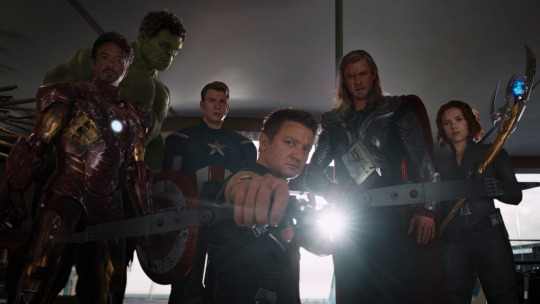
2) The Avengers
This movie feels like a laborious day’s work coming to a close; as the hours wind down and the body’s strength weens, there is a sense of relief and accomplishment at the sight of a job well done. By the time Marvel’s The Avengers released in 2012, four movies and four years had passed since Nick Fury, and subsequently Marvel Studios, hinted at the Avengers Initiative. Marvel had delivered a bombastic entry into their cinematic universe through Iron Man, but proceeded to produce two flops (The Incredible Hulk & Iron Man 2) and two mediocre entries (Thor & Captain America: The First Avenger), leaving fans to wonder what they were buying into . Franchise fatigue began to set in for the first time and fans started to wonder if this elaborate film industry experiment was beginning to be derailed. That’s not to say that these films weren’t successful and the general population wasn’t willing to see them at the box office, but the question remained as to whether this franchise would break the glass ceiling and become something greater. Fortunately, the anticipation of seeing the Avengers team up in a single movie liberated viewers from their cultural malaise. The Avengers succeeded in bringing these separate superheroes together on screen and followed through on Kevin Feige’s original vision for the coherent, overarching narratives of many films to assemble into a single story within the confines of a single film, much like the team ups featured in Marvel’s comic books. The film is able to converge these characters without losing their individuality and allows each hero the time needed to be effective. The Avengers also offers the greatest MCU villain to date in the unruly and sinister Loki, as a continuation of his previous entry in Thor. Villainy was, and always has been, a problem in the MCU, but Tom Hiddleston's Loki is constructed so well and transcends the typical contrivances, that he is able to deliver a menacing performance that places him in the same iconic lineup as Iron Man and Captain America. Since its reception, The Avengers has served as the mold from which all MCU films are now made. Regardless of rumblings of superhero ennui settling in once again among fans, the franchise filmmaking model established by The Avengers is not an indictment on the film itself, but an accolade and example of being the type of film that so firmly supplants itself into the cultural conversation. In an era almost compromised by tedium in superhero filmmaking, The Avengers proved that it was the most evocative superhero film of its time, and that despite cultural listlessness, the MCU was still able to excite and shatter viewers’ expectations.

1) Guardians of the Galaxy
While considering Marvel’s The Avengers and its induction as the mold through which Marvel films are fitted, it is worthy to note that there are a few exceptions. Chief among them is Guardians of the Galaxy. Sure, it’s a superhero team-up movie that is both funny and action packed, but James Gunn took the Avenger model and notched it up to eleven. The film is daringly subversive and the heroes it displays are characters with whom audiences were widely unfamiliar with and unprepared for. Guardians strikes a delightful balance between irreverent and contemplative, and does so without paying attention to the conventions of other Marvel films. Expanding the cinematic universe into the galaxy and unveiling uncharted spatial and character territories quintessentially invigorated the franchise unlike any previous film. There was an unfettered joy in the creation of this film that translates perfectly into the experience of viewing it. It may be argued that Guardians of the Galaxy and The Avengers are tied for first or are out of order, but Guardians is just more delightful than any superhero movie that I have ever seen.
Please comment below and tell me how I’m wrong, or share it with your friends, solidifying my attempt at creating something pure and true.
#Marvel#MCU#iron man#thor#captain america#hulk#hawkeye#black widow#guardians of the galaxy#doctor strange#ant-man#spider-man
5 notes
·
View notes
Text
Urie 400%
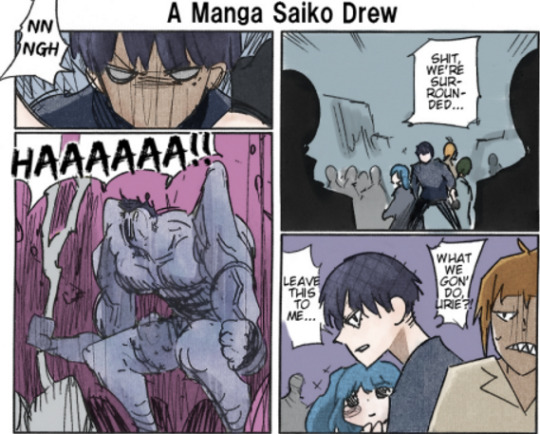
Souced to the TG Calender translation project here: (x)
Urie Kuki has been foreshadowed several times in omake, and in the manga itself that he’s going to acquire a kakuja, or otherwise swelling of his muscles (to a hulk like state). This state form dubbed Urie 400% was first drawn by Saiko in volume four, and has since shown up as a running gag in Omake. Generally though, if something is mentioned more than once, no matter how silly it may seem it can count as foreshadowing.
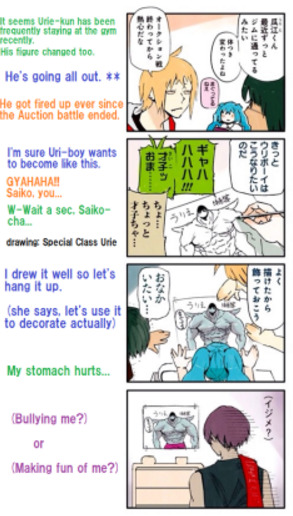
TG: RE volume 4 Omakes by Makyun
While the theory that Urie is going to develop a kakuja, or at least turn full ghoul has been around for awhile, I want to elaborate on how effectively the manga has foreshadowed it, and also how this is going to tie into Urie’s character arc. Starting with the first appearance, Urie 400% showed up immediately after two important events in the manga.
Part 1 Character
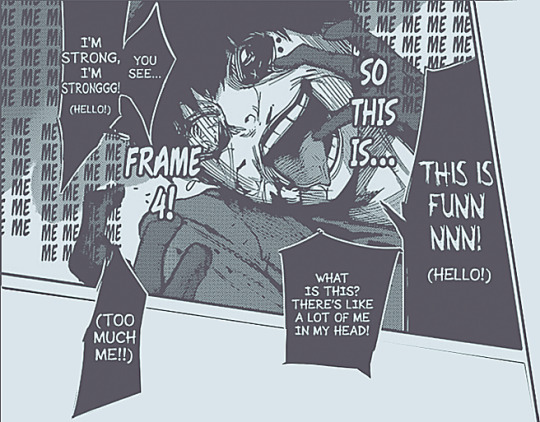
Tokyo Ghoul Re: 29 to seek a nest, page 8
The first being Urie’s breakdown in the auction after his frame 4 surgery. This scene not only parallels Kaneki’s breakdown as he awakens his Kakuja down to positioning, it also clues us in to both characters. Kakuja are purely freudian in nature, they’re characters being overwhelmed by their repressed urges, when they break out it’s pure Id. Which is why they are associated with mental stability or instability, the only characters shown controlling Kakuja for periods of time are the stable and surrounded by friends Yoshimura Kuzen, and the very self controlled and directed Eto Yoshimura.
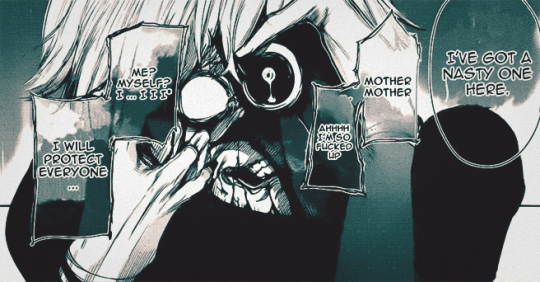
Tokyo Ghoul 101, page 6
If this is a breakdown if Id (I desire) then what do each of them desire in this case. From the ramblings it’s rather obvious to decode. “Me, me, me, me, me, me” and “Me? Myself? I....I, I, I.” This has been interpreted in the past of a confusion of idenitty, especially since Kaneki is elaborated on in the next few chapters of unstably flipping between his gentleness and his viciousness with little cohesion between both. I’m going to put forward a new interpretation though, it’s actually referring to their selfishness. After all usually when a preson thinks “Me, me, me” it’s in the context of being selfish.
Both boys are rambling about their selfish desires. For Urie, it’s for strength, and to “Feel Good”, and Kaneki as well wants strength to “Protect everyone.” Both of these are selfish desires meant to alleviate the boys insecurities. Both of them further break down later, Urie says that he “Hates everything,” to Mutsuki out of frustration and Kaneki realizes he’s not protecting anybody but rather being violent.
Both of these boys have very selfish and nasty desires that are highly repressed, that come out when they feel a rush of their ghoul powers. This is because Urie was deliberately made to parallel Kaneki. If all of the original Q’s are a cross section of Kaneki, Shirazu his want to improve, Urie his struggle, Mutsuki his hypocrisy, and Saiko his innocence (I’ll elaborate more on Mutsuki and Saiko in a different Meta but to prove my point for now, Mutsuki is someone who has a gentle nature and then flips to enjoy killing, while Saiko tries to stay out of conflicts entirely, or acts like her usual self in the middle of them to a fault.)
The tragic element of Kaneki’s struggle is that it’s futile. At the end of the Kanou arc, he asks himself over and over again, “Why?” what is he accomplishing through all this struggle. The correct answer is nothing, as Touka points out to him and Kaneki accepts at the end of his journey at Tokyo Ghoul. None of his actions were protecting Anteiku, he suffered so much and gained so much strength to basically exhaust himself running in circles. He didn’t accomplish his goal of protecting Anteiku, because it was never about Anteiku in the first place, it was about fulfilling his own selfish need for security.
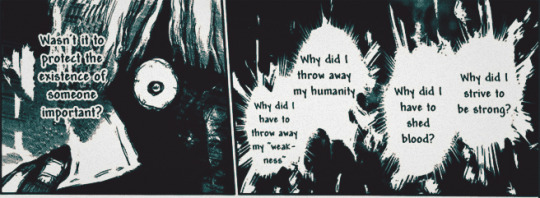
Tokyo Ghoul 107, Page 6
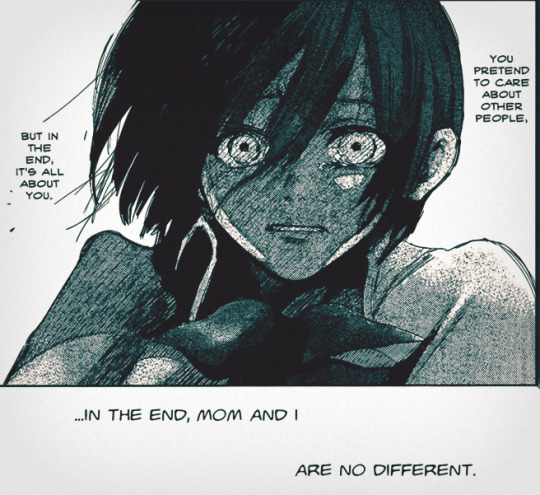
Tokyo Ghoul Re: Chapter 140, page 6
It’s why Kaneki is the central character in a tragedy. He does not change enough, and in time, and in the end succumbs to his flaw. Urie is the embodiment of that part of him, but somehow turned up even more. Urie’s entire being is running himself in circles, and repressing what he really wants to achieve and conflating it with strength. Even his manner of speaking, and being drawn reflects this. Urie often speaks with parenthesis that leave out his true thoughts or finish the rest of his sentences in his head (because he’s kind of a tool). He’s also drawn mouthless even in critical moments, because Urie often does not say what he truly means.
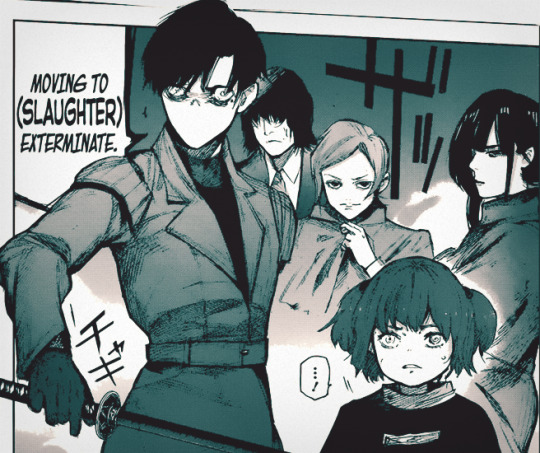
Chapter 95, AM (MS) Page 18
Even in this panel in particular, Urie is masking the word (slaughter) with the much more business like exterminate employed by the CCG. Because the word slaughter, implies he wants to beat Amon up in a bloody rampage for hurting Mutsuki rather than carrying out his duties as an investigator.
The second manifestation of Urie’s struggles comes in his foiling to the character Takeomi. As pointed out Here (x) by Coromoor, this foiling is continued up until this day with Urie being unnerved by Takeomi getting married, and also trying to imitate his stellar feats but failing against Donato. We’ll get to Donato later, but to focus on what Urie wants out of this rivalry. His reasons for hating Takeomi are for the actions of his father, he feels a deep resentment that Urie told his squad to leave without him, and the squad members left. He sees Bujin as somebody who got to grow up in a presumably happy childhood with a father, at the cost of him losing his own father. It might have a deeper root even than that though.
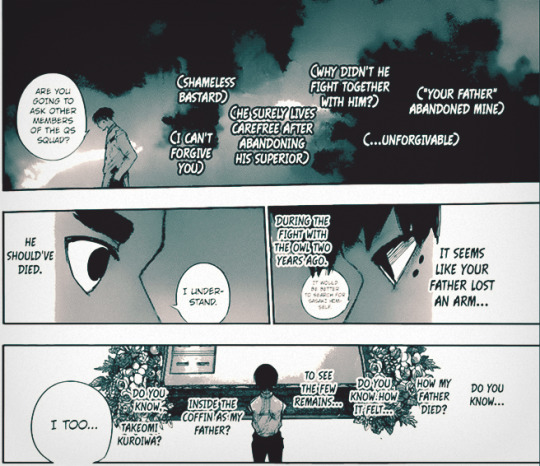
Chapter 9, Inherited Feelings, Page 10
Urie wants acknowledgement for his pain as a really basic desire. Let’s talk about narratives for a moment, from a narrative perspective, Kuroiwa saw the loss of his comrade, but a noble one. As Mikoto Urie himself chose to sacrifice himself for the rest of his squad. Kuroiwa saw the right thing to do in this situation was to take down owl, as that was what Mikoto Urie had sacrificed himself trying to accomplish. In Kuroiwa’s perspective, the matter begins and ends with owl.

Chapter 61, the ENT page 3
Owl dying however, would not make Urie feel better. What he felt was not the noble sacrifice of a comrade but the loss of his father. The narrative that Kuroiwa sees, is shallow and does not account for Urie’s emotions. Which seems to be the main flaw of the Kuroiwas in general, so masculine they are actually completely comfortable in their masculinity and seem generally oblivious to circumstances especially emotional ones. Urie suffered a great emotional loss that was never acknowledged, and because of that he continually feels unsatisfied and directs those emotions at Iwao and Bujin. If he can’t have their ackonwledgement, he wants them to suffer the same negative emotions that he did then, he wants to surpass them, he wants to bury them.

Tokyo Ghoul RE: Inherited Feelings Chapter 9, page 9
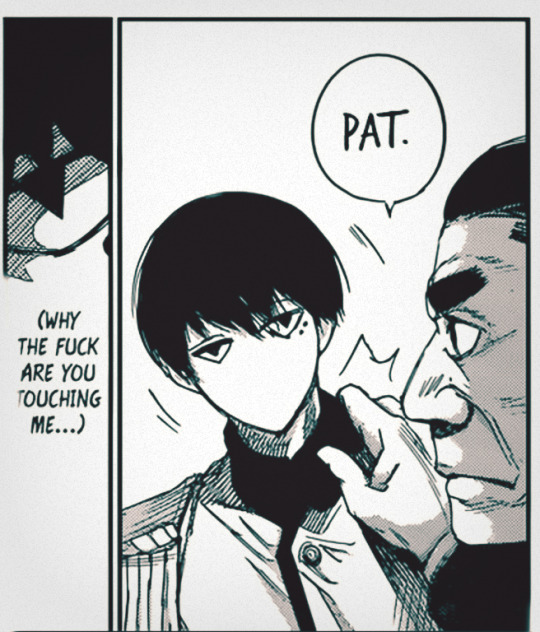
Chapter 32, Eat and Run, page 9
What Iwao sees in this scene, is the son of a former comrade now accomplishing what Mikoto would have wanted him. He is becoming a full fledged investigator in his own right, even without his father around. Therefore he gives him the same acknowledgement of congratulations he gave his own son. This is not what Urie sees, or what Urie wants, ashe sees the man who left his father to die continuing to act like it was nothing, and therefore his pain is nothing.
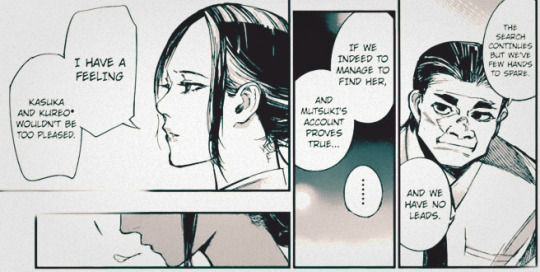
Chapter 104, Sudden Death, Page 6
As I’ve said before, Kuroiwa tends not to understand others or be blinded by his own traditionalism. This is even shown in the cap above where both Aura and Kuroiwa seem to care more about how Akira’s parents would feel about her current situation then Akira herself. Even though Akira’s own narrative has always been about failing to live up to the expectations of her parents, a mother of which she never met, and a father who unconsciously nurtured and expectation of her to be like that mother, and trying to eventually break free from that.
This is not a favorable position, especially since the two adults here are oblivious. They mourn the deaths of a Washuu, who has sent them to meaningless deaths for the sake of securing their own bloodline within the next panel. However, this is the position that Urie aspires to. His ultimate goal, is to reach where the Kuroiwas are, to be so secure in their position, power, and masculinity they don’t have to question anything.
Now while his means of accomplishing that has become different over the course of his development, I will argue that that basic desire (I want to feel secure) has not changed at all. Now, the majority of Urie’s character development is quite obvious, and has been summarized elsewhere so rather than talking about how he has changed, I will elaborate on how despite all of that change he’s remained the same in character . The key word of the day is Sisyphean, a lot of effort but with no development. A pointless struggle. You push the boulder all the way up to the top of the hill and it rolls to the bottom.
The events that are happening in the manga, deliberately call back to what was set up all within the first ten chapters for Urie. Chapter 3 was when Donato was first introduced. This conversation shows the way that Urie sees the world, in terms of credit and achievement. His means of getting what he wants (To feel secure, acknowledgement) are through climbing the rigid system of merit set up by the CCG. He also remarks on his preference to work alone.
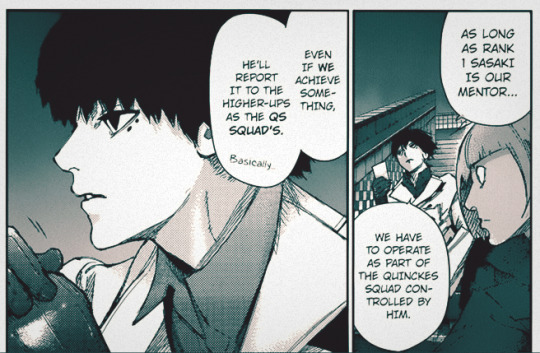
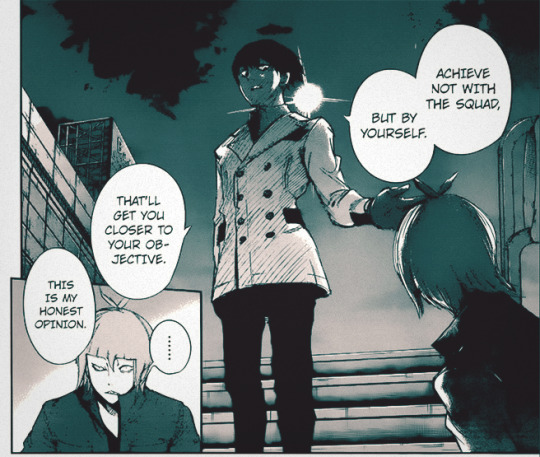
Tokyo Ghoul Re: Chapter 8 Bell, Pages 6, 8
While Urie has grown significantly to be more aware of others, and even value them he as not once broken free from the framework surrounding him. Even when he is trying to encourage others, or when trying to speak sincerely he always sees it through the lens of rank and accomplishment.
We see this again,
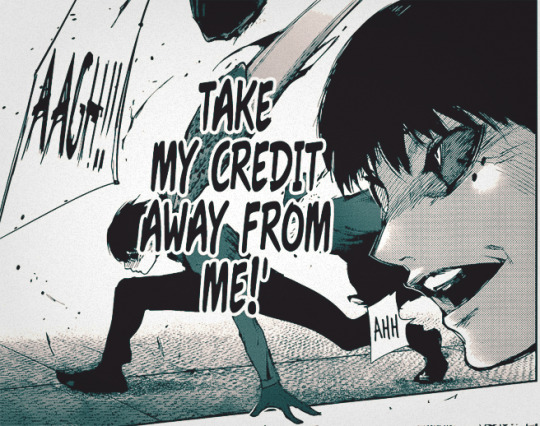
Chapter 26, Ah. Page 4
Again.
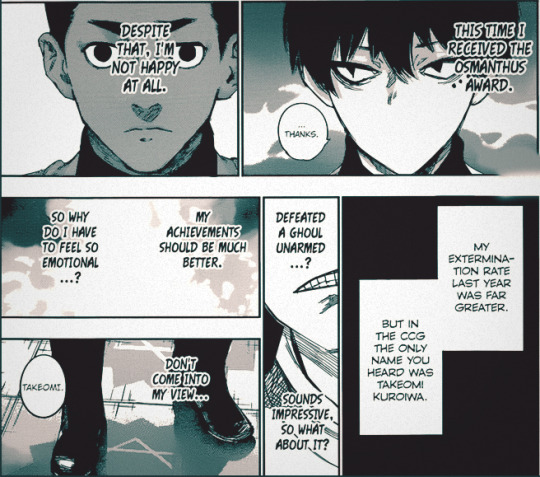
Chapter 32, Eat and Run, page 8
Again.
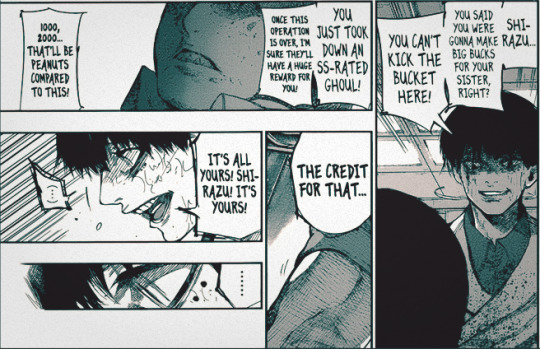
Chapter 55, Alice & Amp, page 8
Again.
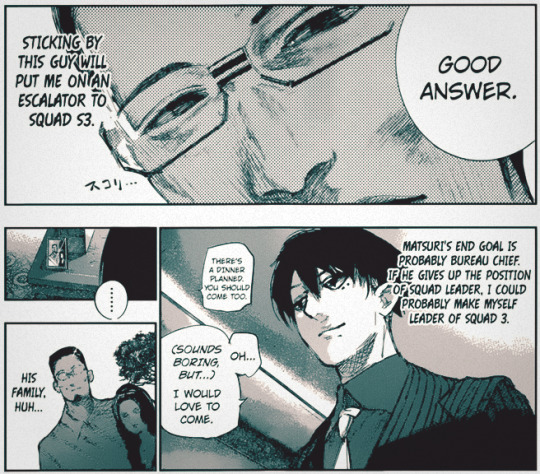
Chapter 59, Kneel Page 13
Again.
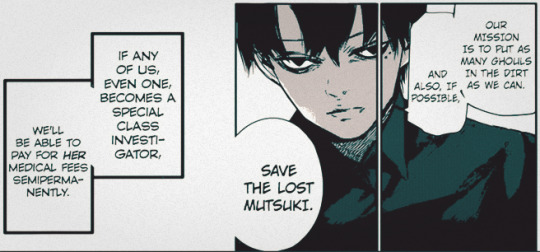
Chapter 64: A Devouring Gut, page 6
And Again.
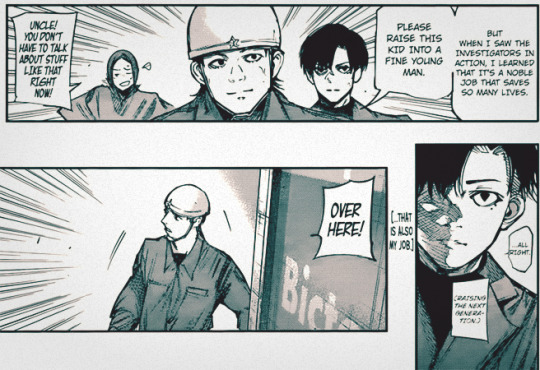
Chapter 106: A Hopeless Course, Page 17
Urie refuses to let go of this framework of advancing through the system of the CCG and earning what he wants in that way. The second thing established in this chapter, Urie prefers to work alone. Which we also see him reminded of.
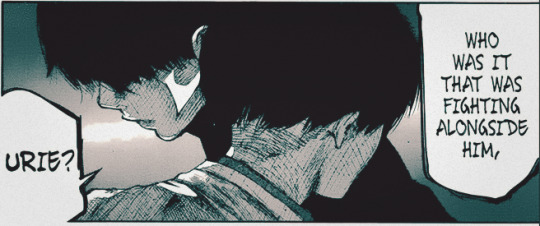
Chapter 57, Regretting Smile, Page 10
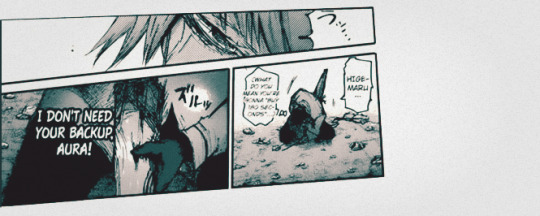
Chapter 98, Old School, Page 10
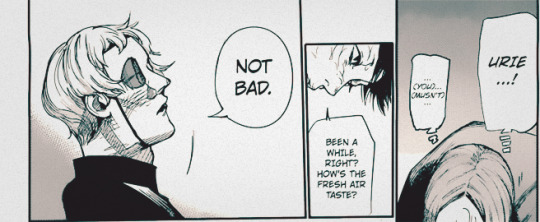
Chapter 108, Eternity, Page 15
He charges in alone against Amon in the end whent he battle turns unfavorable extremely recklessly, and he tells Higemaru to fall back against Donato while he serves as a distraction. It’s especially poignant from a sins of the fathers perspective, as Urie is exactly mad at Kuroiwa for that same reason, yet here he is repeating the habit of telling others to stand down while he handles everything alone. The only thing that has changed is his motivation. Which ties into Donato, and is the real reason he’s fighting him.
Urie is this sequel :RE manga’s equivalent of Amon Koutarou. The two of them both ascribe to rank and advancement, and hunt ghouls to sovle their own issues and insecurities that have a basis in their father. The most important similiarity between the two of them though, is that what Urie wants right now but what he’s failing to realize is the same realization Amon failed to make.
The two of them only want to fight to protect their friends. However, they are too tied into the logic and system of the CCG that neither of them can realize it, and therefore neither of them can achieve what it is they want. They are, as characters, stalled.
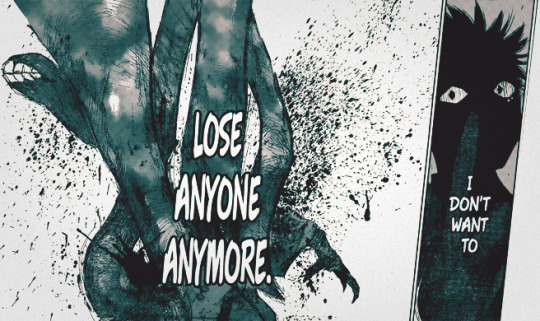
Tokyo Ghoul Re: 97 Body Alone, 21
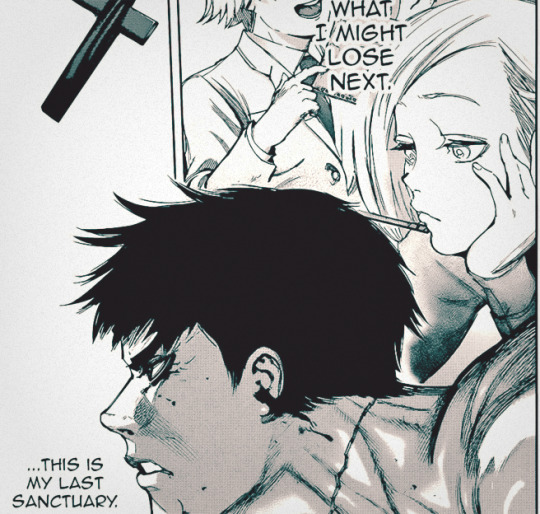
Tokyo Ghoul 134, Page 14
Amazing how Urie thinks the exact same words that Amon did, a moment before slaughtering him. Despite being so similiar though, Urie was never going to come to an understanding to Amon. Because Amon was a ghoul.
Part 2 Body Development
Finally we’re getting back to the second thing that happened before the first Urie 400% comic arrived. Urie got crunk.
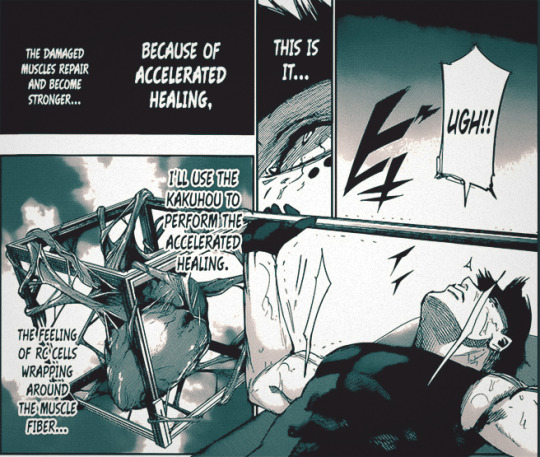
Chapter 37 Dead Secret, Page 6
Urie has specifically, been concentrating all of his RC cells into his muscles since receiving the frame 4 operation. After repeatedly releasing his frames again and again, the results of this are obvious Urie is about to cross a point of no return. Rather than recap his slow development into a ghoul over the course of the manga though, as that’s been covered elsewhere let’s touch on the foreshadowing of why exactly it is important.
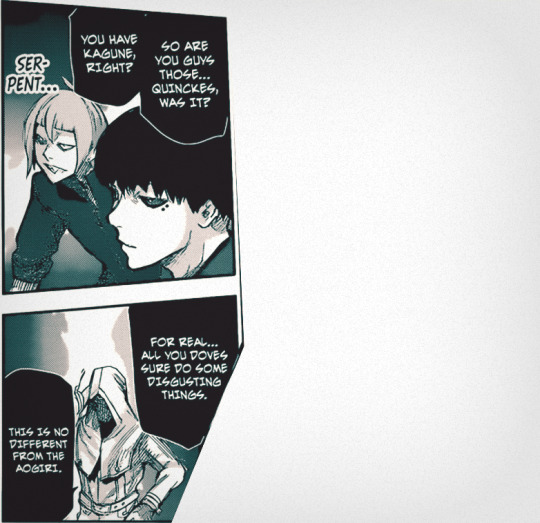
Chapter 6: A Bad Gamble for the Possessed, Page 1
First off, there is an unwritten horror about the Quinx surgery. Unlike Kanou’s half ghoul surgery which forces its patients to effectively become ghouls, thus having to struggle with the same problems that ghouls do, an unquenchable hunger, a horrifying body. The Quinx are allowed to use the abilities of ghouls without having to suffer the same way ghouls do. Therefore no Quinx has any significant sympathy for ghouls, and is effectively an emotionless weapon against them. Even Shirazu and Saiko, who questioned there role in fighting ghouls never actually did anything about it. Saiko was even handed an oppurtunity on a golden platter, and basically made no decision on how to react to Amon until she was forced to fight.
The horrifying thing of Urie’s slow transformation is not that he is becoming a ghoul (half the characters in the manga are ghouls anyway, everybody’s a ghoul now), but rather his attitude towards ghouls. He has no sympathy for them at all, and the image he has in his head of ghouls, as killers without remorse that need to be exterminated - is Urie all that different?
There has been foreshadowing about Urie turning into a ghoul from the start of the manga, and most of it has to do with ironies present in his attitude.
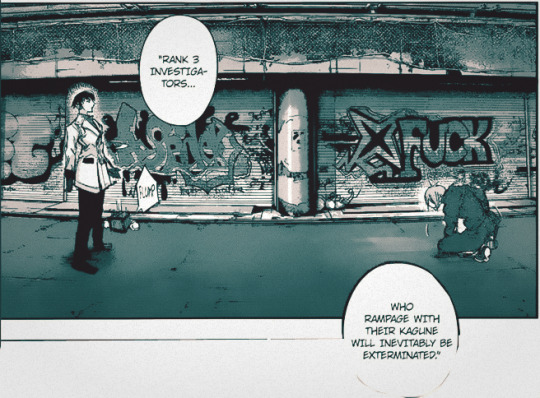
Chapter 2, The Neglected Helm and the Fearful Serpent, Page 22
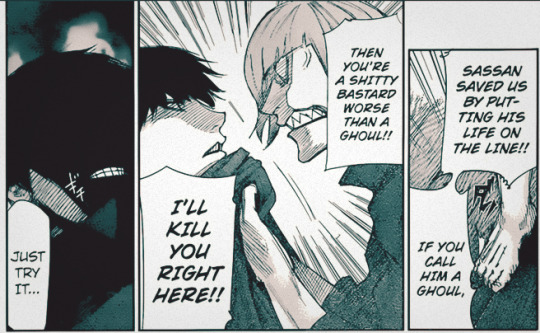
Chapter 8, Agent 8 Page 5
Early on it’s set up that not only should investigators who lose control of their kagune be exterminated, but that Urie might just be a shitty bastard worse than a ghoul.
He repeatedly denies ghouls their humanity. Here is Urie giving a speech about how important it is to have the bodies of the dead. In the next few chapters he’s shown using a quinque made of a dead guardian who was so important to Eto, his deaths is one of the many reasons for her revolution.
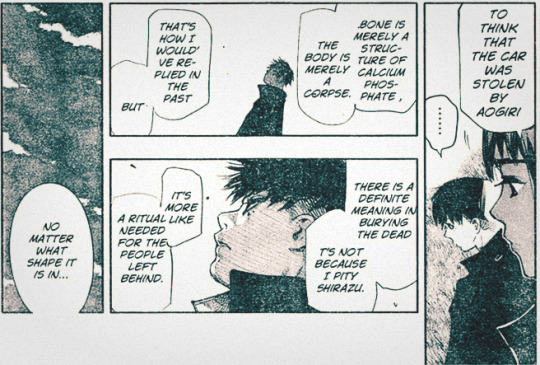
Chapter 58 Playfully Faint, Page 12
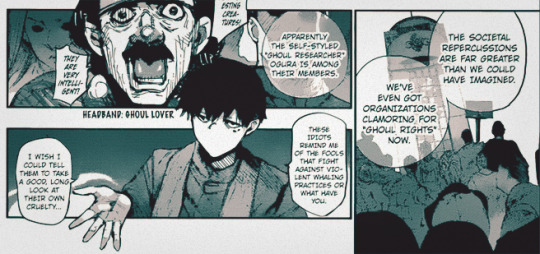
Chapter 16, Heavy Steps, Page 16
Here is Urie comparing ghouls to whales. “Take a good long look, at their own cruelty.” Interesting Urie.
Until we reach the current showdown. Urie is against Donato, and look at his revulsion for Donato’s actions.
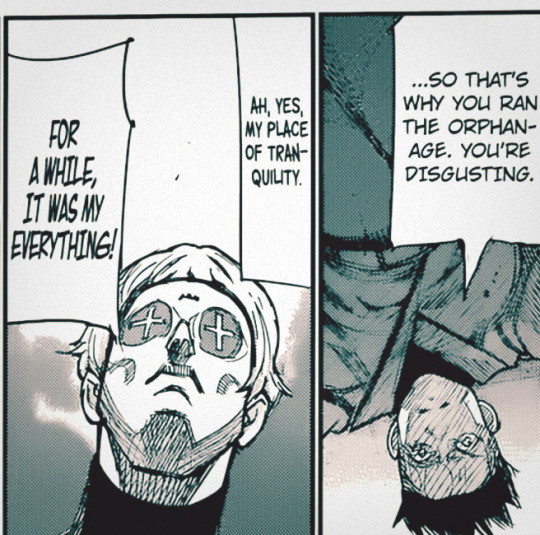
Chapter 108 Eternity, Page 16
Yes, to Urie killing children is disgusting. Unless they are ghoul children who were imprisoned for saving your mentor, and then are going to be executed by being put into a blender.
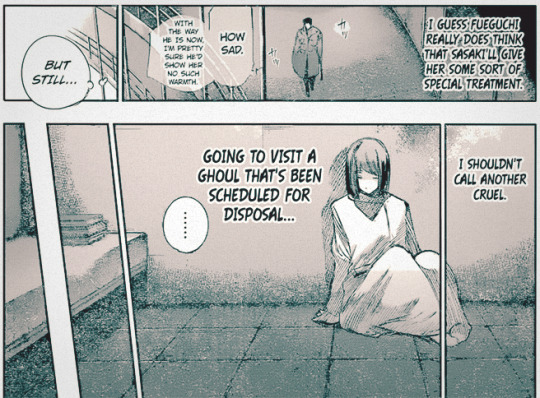
Chapter 59 Kneel, Page 17
Perhaps Donato is worse than Urie and deserves to be imprisoned because he enjoys bloodshed. He kills and devours others who are weaker than him for the sake of his own personal enjoyment.
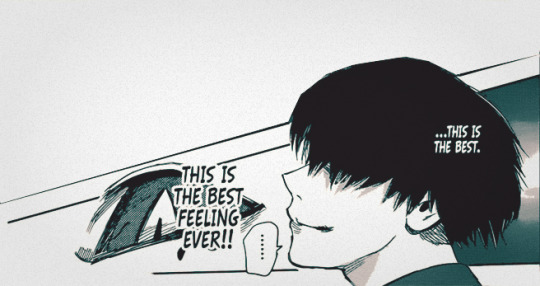
Chapter 27, Calling out to Within, Page 8
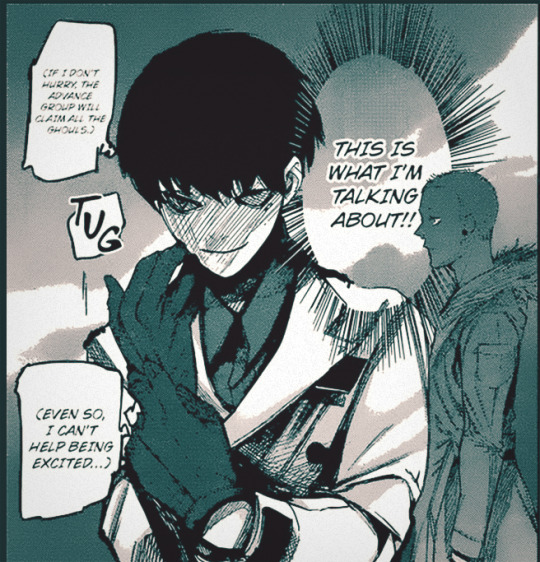
Chatper 46, C page 16
Then perhaps it’s because ghouls kagunes are too powerful, and they themselves mess with a power they cannot control. Urie even remarks something along those lines when he sees Amon’s Kakuja go out of control.
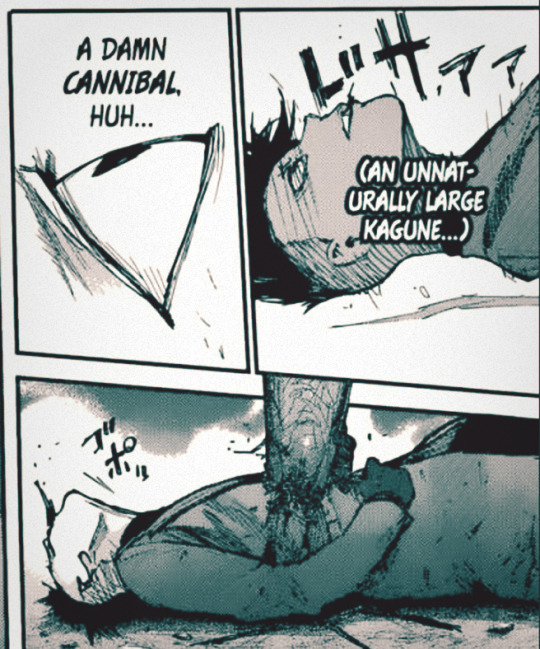
Chapter 98, Old School, Page 5
Except whose been shown steadily trying to master his own power with reckless ambition.
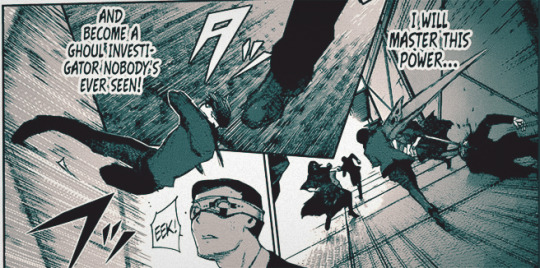
Chapter 27, Calling out to Within, Page 8
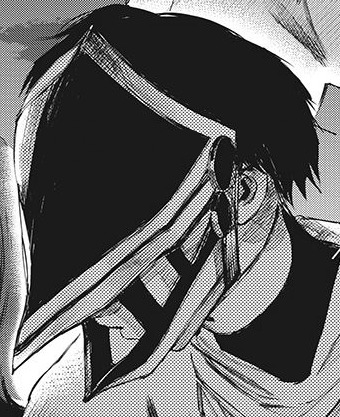
Who has been foreshadowed to develop into a Kakuja?
Who has been compared with centipede Kaneki at his literal worst point?
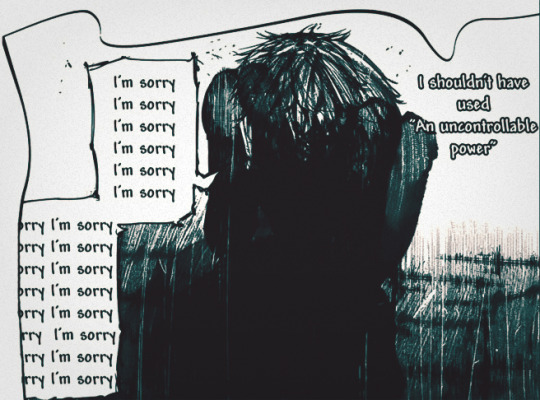
Chapter 107, Page 6
Urie has been able to get away all this time not sympathizing with ghouls at all because he is a human. No matter how much progress he’s made, he’s stayed stagnant on this point. That is why, he is most likely going to turn into a horrifying kakuja like monster comparable to Amon, especially since all of his kagune currently are in his muscles.
The important part will not be the transformation though, but after. When Urie becomes irreversibly a ghoul, he’ll finally be treated the way they are. There’s a reason that in the one calendar page he shares with Matsuri, Matsuri is drawn as Van Hellsing, while he is drawn as Dracula, the antagonist and monster of the novel.
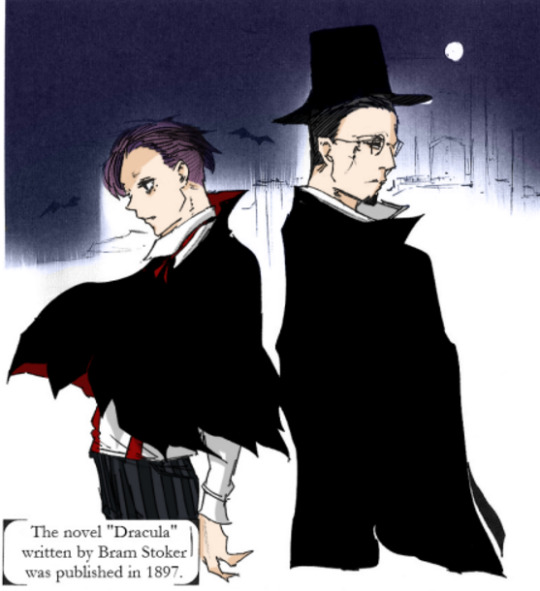
Tokyo Ghoul Calendar, translation done here by Michi. (x)
Urie has been able to be the protagonist in his own story of development for quite some time. However, perhaps that was not the true role he was meant to play. Soon, he might even feel what it is like to be an antagonist.
404 notes
·
View notes